












Volume 32 • NUMBER 15
1123 S. CHURCH ST. CHARLOTTE, N.C. 28203-4003 catholicnews@charlottediocese.org
704-370-3333
PUBLISHER
The Most Reverend Peter J. Jugis Bishop of Charlotte
Arts & Entertainment 10-11
Contact us 2
16-17
LOVE LIKE ST. GIANNA BERETTA MOLLA
In honor of the heroic love of St. Gianna Beretta Molla, whose feast day is April 28, donate to your favorite pro-life charity and pray for those facing similar circumstances. St. Gianna, an Italian pediatrician and mother, is known for saving the life of her unborn child when faced with three medical interventions for a life-threatening condition – only one of which would save her baby. That procedure also meant a bigger risk to her own life. For more, see page 3
PLAN A MAY CROWNING FOR CHILDREN

In the Catholic Church, the month of May is dedicated to the Blessed Virgin Mary. For centuries, Catholics have held coronations to honor the Mother of Christ, who is also our mother. The tradition of creating and placing a crown of flowers on a statue of Mary leaves a lasting impression on children, often creating a lifelong love of our Holy Mother. For tips and ideas: www.thereligionteacher.com/maycrowning-activities.
CELEBRATE ST. JAMES THE LESSER
May 3 is the feast of St. James the Lesser, one of the 12 Apostles chosen by Jesus and identified in Scripture as the son of Alphaeus. In a 2006 general audience, Pope Benedict XVI noted that St. James the Lesser “teaches us not to presume to plan our lives autonomously and with self-interest, but to make room for the inscrutable will of God, who knows what is truly good for us.” Ask St. James to help you discern God’s will and watch a powerful (and popular) scene between Jesus and “Little James” in the second episode of Season 3 of “The Chosen.”
OPEN EYES, MINDS AND HEARTS TO THE REAL PRESENCE
EDITOR: Spencer K. M. Brown
704-808-4528, skmbrown@charlottediocese.org
ADVERTISING MANAGER: Kevin Eagan
704-370-3332, keeagan@charlottediocese.org
HISPANIC MEDIA MANAGER: César Hurtado
704-370-3375, rchurtado@charlottediocese.org
EDITORIAL TEAM: Kimberly Bender
704-370-3394, kdbender@charlottediocese.org
Annie Ferguson
704-370-3404, arferguson@charlottediocese.org
SueAnn Howell
704-370-3354, sahowell@charlottediocese.org
Troy C. Hull
704-370-3288, tchull@charlottediocese.org
GRAPHIC DESIGNER: Tim Faragher 704-370-3331, tpfaragher@charlottediocese.org
COMMUNICATIONS ASSISTANT/CIRCULATION: Erika Robinson 704-370-3333, catholicnews@charlottediocese.org
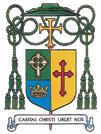
COMMUNICATIONS DIRECTOR: Liz Chandler
704-370-3336, lchandler@charlottediocese.org
ASSISTANT COMMUNICATIONS DIRECTOR: Patricia L. Guilfoyle 704-370-3334, plguilfoyle@charlottediocese.org
THE CATHOLIC NEWS HERALD is published by the Roman Catholic Diocese of Charlotte 26 times a year.
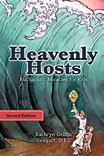
NEWS: The Catholic News Herald welcomes your news and photos. Please e-mail information, attaching photos in JPG format with a recommended resolution of 150 dpi or higher, to catholicnews@charlottediocese.org. All submitted items become the property of the Catholic News Herald and are subject to reuse, in whole or in part, in print, electronic formats and archives.
ADVERTISING: Reach 165,000 Catholics across western North Carolina! For advertising rates and information, contact Advertising Manager Kevin Eagan at 704-370-3332 or keeagan@charlottediocese.org. The Catholic News Herald reserves the right to reject or cancel advertising for any reason, and does not recommend or guarantee any product, service or benefit claimed by our advertisers.
SUBSCRIPTIONS: $16.75 per year for registered families of the Diocese of Charlotte and $23 per year for all others
POSTMASTER: Periodicals Class postage (USPC 007-393) paid at Charlotte, N.C. Send address corrections to the Catholic News Herald, 1123 S. Church St., Charlotte, N.C. 28203.
As the month dedicated to the Holy Eucharist comes to a close, commit to fostering your love for the Real Presence and that of the children in your life. Young and old can enjoy stories of Eucharistic miracles all year long in “Heavenly Hosts: Eucharistic Miracles for Kids,” the best-selling book by Kathryn Griffin Swegart. A great read aloud, this book helps open eyes, hearts and minds to the Real Presence of Jesus in the Eucharist. Buy a copy from your favorite bookseller or www. kathrynswegart.com
ESPAÑOL
HORA SANTA : 7-8 p.m. Todos los jueves del mes con excepción de los primeros jueves. En la Capilla del segundo piso, Family Life Center en St. Patrick, 1621 Dilworth Road East, Charlotte.
VIGILIA DE ADORACIÓN: 6 p.m. los jueves, en la Catedral San Patricio, 1621 Dilworth Road East, Charlotte. Nos reunimos para una Vigilia de Adoración por la Paz y la Justicia en Nicaragua,
IGBO MASS : 11:30 a.m. Sunday, May 14, St., Mary’s Church, 812 Duke St., Greensboro. Mass will be offered in the Igbo language of Nigeria. For details, call 336-707-3625.
HOLY HOUR FOR LIFE : 10 a.m. Saturday, May 20, St. Eugene Church, 72 Culvern St., Asheville. The Asheville chapter of Sidewalk Advocates for Life (SAFL) is sponsoring an hour of Adoration of the Blessed Sacrament, with rosary and Benediction, followed by a discussion of the mission and ministry of SAFL of Asheville (with snacks). At noon,
attendees will be invited to proceed to Planned Parenthood in Asheville for an hour of peaceful prayer and observation of Sidewalk Advocates doing loving outreach. For details, contact Elizabeth or Leigh at SAFL. AshevilleNC@gmail.com.
HOLY APOSTLE AND EVANGELIST
LUKE MISSION (UKRAINIAN CATHOLIC CHURCH) : Divine Liturgy (Mass) at 3 p.m. Sundays at St. Barnabas Church, 109 Crescent Hill Road, Arden. For details, email ucmcanton@gmail.com.
SAFE ENVIRONMENT TRAINING
PROTECTING CHILDREN: Protecting God’s Children (Protegiendo a los Niños de Dios) workshops educate parish volunteers to recognize and prevent child sexual abuse. For details, contact your parish office. To register for online training, go to www. virtus.org. Upcoming workshops:
SYLVA: 11 a.m. Thursday, May 4, St. Mary Church, 22 Bartlett St.
PRAY FOR YOUR PARISH PRIEST
St. John Vianney, the patron of parish priests, was born May 8, 1726, in Dardilly, France. He is known for many things, including the conversion of the town of Ars, listening to confessions for hours on end, and suffering attacks from Satan. Remember that our priests today also are special targets of the evil one, so it is helpful to pray for them on their patron’s birthday and always. For suggested prayers and more, visit www.foundationforpriests.org
— Annie FergusonSUPPORT GROUPS
RACHEL RETREAT: Are you or a loved one seeking healing from the effects of a past abortion? A Project Rachel retreat weekend will be offered May 5-7. For details, contact Jessica Grabowski: 704-370-3229 or jrgrabowski@rcdoc. org.
TALKS
TENTH ANNUAL EAST MEETS WEST RETREAT: Friday-Saturday, June 23-24, St. Barnabas Church, 109 Crescent Hill Road, Arden. A program of Holy Apostle and Evangelist Luke Ukrainian Catholic Mission, the retreat will be led by Matthew K. Minerd, Ph.D, professor of philosophy and moral theology at Byzantine Catholic Seminary of Sts.
Cyril and Methodius in Pittsburgh, Pa.
Minerd, a member of the Byzantine Catholic Church, will present three talks based on his recently published book “Made By God, Made For God: Catholic Morality, Explained.” No registration required. An offering is suggested. For details, email Father Kevin Bezner at ucmcanton@gmail.com.
MAY 3 – 6 P.M.
Sacrament of Confirmation
St. John Neumann Church, Charlotte
MAY 9 – 11 A.M.
Presbyteral Council Meeting
Pastoral Center, Charlotte
MAY 12 – 6 P.M.
Sacrament of Confirmation
St. Gabriel Church, Charlotte
St. Gianna Beretta Molla was an Italian pediatrician born in Magenta in the Kingdom of Italy on Oct. 4, 1922. She was the 10th of 13 children in her family.
At 3 years old, she and her family moved to Bergamo, and she grew up in the Lombardy region of Italy.
As a young girl, she embraced her faith and the CatholicChristian education provided to her from her loving parents. She grew up viewing life as God’s beautiful gift and found the greatest necessity and effectiveness in prayer.
In 1942, she began the study of medicine in Milan. She was a diligent and hardworking student, both at the university and in her faith.
As a member of the St. Vincent de Paul Society, Gianna applied her faith in an apostolic service for the elderly and needy.
She earned degrees in both medicine and surgery from the University of Pavia in 1949, and in 1950 she opened a medical office in Mesero, near her hometown of Magenta.
In 1952, Gianna specialized in pediatrics at the University of Milan and from there on, she was especially drawn toward mothers, babies, the elderly and the poor.
Gianna considered the field of medicine to be her mission and treated it as such. She increased her generous service to Catholic Action, a movement of lay Catholics dedicated to living and spreading the social teaching of the Catholic Church in the broader culture.
She chose the vocation of marriage and considered this to be a gift from God. Gianna embraced this gift with all her being and completely dedicated herself to “forming a truly Christian family.”
In December 1954, Gianna met Pietro Molla, an engineer who worked in her office. They were officially engaged the following April and married in September 1955.
In November 1956, Gianna became a mother to her first child, Pierluigi. They welcomed a second child, Maria Zita, in December 1957 and a third, Laura, in July 1959.
Gianna handled motherhood with grace and was able to harmonize all aspects of her demanding life.
In 1961, Gianna became pregnant with her fourth child. Toward the end of her second month of pregnancy, Gianna was struck with an unimaginable pain. Her doctors discovered she had developed a fibroma in her uterus, meaning she was carrying both a baby and a tumor.
After examination, the doctors gave her three choices: an abortion, which would save her life and allow her to continue to have children, but take the life of the child she carried; a complete hysterectomy, which would preserve her life, but take the unborn
APRIL 30-MAY 6
Sunday: Acts 2:14a, 36-41, 1 Peter 2:20b25, John 10:1-10; Monday (St. Joseph the Worker): Acts 11:1-18, John 10:11-18; Tuesday (St. Athanasius): Acts 11:19-26, John 10:2230; Wednesday (Sts. Philip and James): 1
Corinthians 15:1-8, John 14:6-14; Thursday: Acts 13:13-25, John 13:16-20; Friday: Acts 13:26-33, John 14:1-6; Saturday: Acts 13:4452, John 14:7-14
child’s life and prevent further pregnancy; or removal of only the fibroma, which had the potential of further complications but could save the life of her baby.
Catholic teaching affirms what medical science, natural law, the Bible and unbroken Christian tradition affirm: The child in the womb has a fundamental human right to life. Wanting to preserve her child’s life, Gianna opted for the removal of only the fibroma. In fact, she was willing to give her own life to save the life of her child.
Gianna pleaded with the surgeons to save her child’s life over her own. She sought comfort in her prayers and her faith. The child’s life was saved, for which Gianna graciously thanked the Lord. After the operation, complications continued throughout her pregnancy, but Gianna spent the remainder of her pregnancy with an unparalleled strength and insistent dedication for her tasks as a mother and a doctor. A few days before the baby was to be born, Gianna prayed the Lord take any pain away from the child. She recognized she might lose her life during delivery, but she was ready.
St. Gianna Beretta Molla, patron saint of mothers, physicians and unborn children, is pictured with two of her four children.
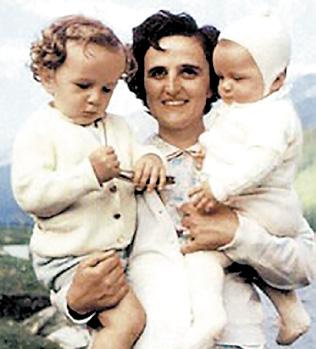
The prayers of nuns and monks are like “oxygen” for all members of the Catholic Church, Pope Francis said.

“Their prayer is the invisible force that sustains the mission,” he told people at his weekly general audience April 26.
As part of his series of talks about “zeal” for evangelization, Pope Francis spoke about nuns and monks. These are “sisters and brothers who renounce themselves and renounce the world to imitate Jesus on the path of poverty, chastity, obedience and to intercede on behalf of all.”
They are also great evangelizers, he said.
Gianna was quite clear about her wishes, expressing to her family: “If you must decide between me and the child, do not hesitate: Choose the child. I insist on it. Save the baby.”
On April 21, 1962, Gianna Emanuela Molla was successfully delivered by Caesarean section. The doctors tried many different treatments and procedures to ensure both lives would be saved. However, on April 28, 1962, a week after the baby was born, Gianna passed away from septic peritonitis. She is buried in Mesero.
Gianna was beatified by Pope John Paul II on April 24, 1994, and officially canonized as a saint on May 16, 2004. Her husband and their children, including Gianna Emanuela, attended her canonization ceremony, making this the first time a husband witnessed his wife’s canonization.
In 2003, mother-to-be Elizabeth Comparini experienced a tear in her placenta when she was 16 weeks pregnant. Her womb was drained of all amniotic fluid. She was told the chances of her baby’s survival were little to none. Elizabeth is said to have prayed to Gianna Molla and asked for her intercession. Elizabeth later gave birth to a healthy baby.
During Gianna’s canonization ceremony, the pope described her as “a simple, but more than ever, significant messenger of Divine Love.”
St. Gianna Beretta Molla is the patron saint of mothers, physicians and unborn children.
— www.CatholicOnline.com
People might wonder how men and women religious who live in monasteries and convents help the proclamation of the Gospel, the pope said. “Wouldn’t they do better to put their energies into the mission” by evangelizing outside a monastery and in the world?
“In reality, monks and nuns are the beating heart of the proclamation,” he said, and “their prayer is oxygen for all the members of the Body of Christ.”
In fact, the pope said, the patron saint of missions is a nun: St. Thérèse of Lisieux. Writing about discovering her vocation, she said, “I understood that the Church had a heart and that this heart was burning with love.”
“My vocation is love!” she wrote. “In the heart of the Church, my mother, I shall be love.”
Contemplative nuns and monks, the pope said, pray and work in silence for the entire Church.
“This is love: it is the love that is expressed by praying for the Church, working for the Church, in the monasteries,” he said. This love for everyone “is translated into their prayer of intercession.”
“Among monks and nuns there is a universal solidarity,” Pope Francis said. Whatever happens in the world, it finds a place in their hearts, and they pray.”
MAY 7-13
Sunday: Acts 6:1-7, 1 Peter 2:4-9, John 14:1-12; Monday: Acts 14:5-18, John 14:2126; Tuesday: Acts
Their hearts are like “an antenna,” he said. “It picks up what happens in the world and prays and intercedes for this. And in this way, they live in union with the Lord and with everyone.”
“They weep for their sins – after all, we are all sinners – and they also weep for the sins of the world, and they pray and intercede with their hands and heart raised up,” he said.
“They are the true strength, the true force that carries the people of God forward,” he said, praying that God bless the Church with “new monasteries” and “new monks and nuns to carry the Church forward with their intercession.”
CHARLOTTE — After four years of military service and two years of trade school, Basil Duncan fell into what he calls “fast living” and eventually ended up in prison for larceny. When he got out in 2020, he set out to turn his life around.
With no home or money for rent, Duncan could find only limited temporary shelter through different veterans programs.
Then he found Catholic Charities Diocese of Charlotte. The agency’s veterans assistance program reaches hundreds of homeless and other struggling veterans annually – thanks to the support of staff, volunteers and donors living out God’s call to help those in need.
“When I got with Catholic Charities, everything fell into place,” Duncan says. “I wake up happy and go to bed happy. I’m making it work my way.”
Catholic Charities placed Duncan in a Charlotte duplex almost a year ago – also providing food, clothes and furniture – and linked him to employment and other services provided through its Supportive Services for Veteran Families program. Duncan now works part-time at Bank of America Stadium and hopes to buy a car by the end of the year.
Finding permanent housing is more than just putting a roof over someone’s head, says Tonya Lawrence, Catholic Charities’ supportive services supervisor. “It is personally rewarding for me,” she said, “to watch an individual or family come into the program and see how providing assistance with obtaining housing

permanence can be the answer to all of the other concerns in their life.”
Since Catholic Charities launched the effort in 2019, Supportive Services for Veteran Families has helped more than 413 veterans experiencing or at risk of homelessness in the greater Charlotte area. Last year, the agency also participated in a national initiative by the U.S. Department of Veterans Affairs to place 38,000 veterans into housing –and exceeded the local goal by placing 362 veterans in the Salisbury area.
“Having a decent place that does not limit the length of stay is critical before people can gain stability,” Lawrence said.
In addition to its veterans outreach, Catholic Charities leapt in recently to manage the resettlement of more than 50 people living in Charlotte’s “Tent City,” a highly visible encampment then located alongside Brookshire Freeway where more than 100 people had pitched tents in 2021. When the government stepped in to break up the encampment, campers were moved to hotels where federal emergency funding paid for temporary housing until Catholic Charities and other organizations, partnering with the United Way, resettled residents into permanent housing.

Catholic Charities has long advocated for people facing housing instability – and in 2022 was named Charlotte’s “Provider of the Year” by Veterans Bridge Home, a national organization that helps veterans and their families navigate re-entry into their communities through a network of partner service providers. Finding housing is always the biggest challenge.
“We maintain landlord workgroups and engage them to explain our services and our concern about homelessness in the area, and we enlist their assistance to find housing in a community with a severe lack of affordable housing,” Lawrence said.
At the same time, Catholic Charities’ Refugee Resettlement program has navigated the tight housing markets in Charlotte and Asheville to find homes for hundreds of people fleeing Afghanistan, Ukraine and other countries around the world.
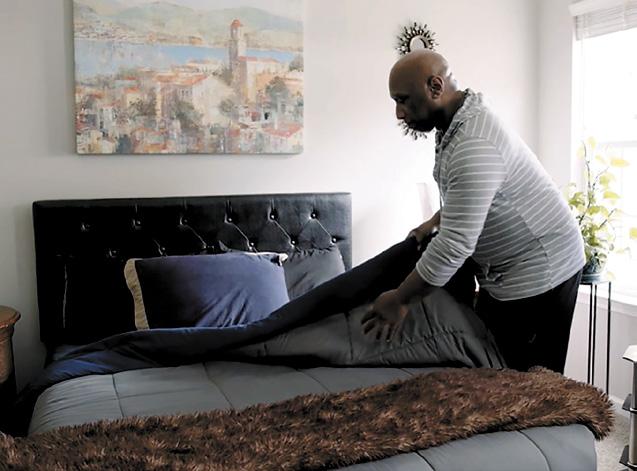
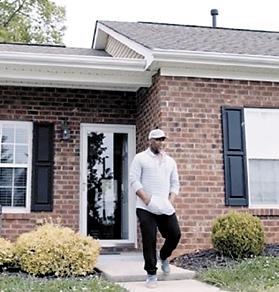
In each of its programs, Catholic Charities focuses on wraparound “case management” for individuals and families in need, linking their clients with an array of services to help them back on their feet.
Its veterans program provides supportive services specifically to very low-income veteran families who are homeless or at risk of homelessness – with the ultimate goal of ending homelessness among veterans.
“All individuals have the right to have a safe haven to go to every night to call home,” Lawrence said. “Housing permanence fits in the mission of Catholic Charities by providing a service to people in need.”
Basil Duncan is grateful and optimistic for his future.
“It’s really hard trying to get back on my feet. When Catholic Charities offered me a place to live, it really set me up tremendously because I can save more money that way. And Catholic Charities coordinated furnishings and clothes and food. It really puts your faith in people again.’’
If you know a veteran who struggles with housing instability, call 2-1-1 and complete a Coordinated Entry Assessment or call Catholic Charities’ supportive services supervisor Tonya Lawrence at 704-370-3257
Catholic Charities’ Supportive Services Encampment Project does not receive open referrals, but your monetary contributions directly assist in addressing housing issues. Donate online at www.ccdoc.org.
GEORGIANNA PENN
Special to the Catholic News Herald
GREENSBORO — More than 280 people gathered for the 2023 St. Pius X School Biennial fundraising gala at Greensboro Country Club March 18. Celebrating a sports theme with live music, live and silent auctions, great food and fellowship, the gala was a huge success in raising funds for the school.
Having not hosted the gala since 2019 due to the COVID-19 pandemic, this year’s gala was especially a cause for celebration. One main attraction of the event was a live painting of the inside of St. Pius X Church by renowned local artist Chip Holton.
Holton, who painted spontaneously from a reference photo of the moment of Consecration during a Mass at St. Pius X Church, is the Artist in Residence at O.Henry Hotel in Greensboro and has painted unique murals for the Catholic community in the Triad. Most notably, Holton painted the large mural of Ireland’s famous Gap of Dunloe inside the Irish Village section of Pennybyrn at Maryfield in High Point, celebrating the homeplace of the religious sisters who founded Pennybyrn.
One lucky couple got to take the painting home.
“We never thought we’d leave with the painting,” said parishioner Tyler Helms, who enjoyed the thrill of out-bidding friends for the very special painting of St. Pius X Church. “This is our church, this is our faith, this is our life.”
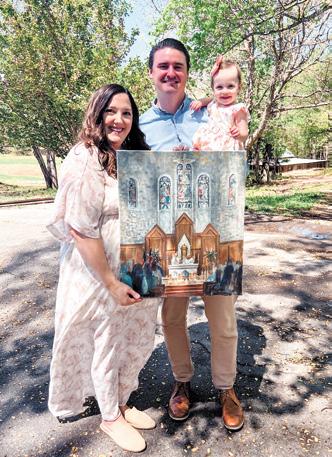
“Watching the artist paint each part of what is the centerpiece of our lives and being able to have that visual in our home is very special,” added Kasey Helms.
With close ties to the school and parish, Kasey and Tyler Helms seem the perfect recipients of this unique live auction treasure. Tyler Helms grew up at St. Pius X Parish, played basketball and graduated from St. Pius X School.
“I remember the old church and watched our new church being built,” he said. “So many memories and moments.”
Parish is not only their past, but the growing family’s present and future.
And for the Helms, what better way to tell their story than through this picture?
In addition to their vocation as parents and spouses, Tyler and Kasey Helms are co-owners of Point200, capturing pinnacle moments of young couples on their wedding day and more. During the pandemic, “we were able to tie in our talents with our faith,” said Tyler Helms.
The couple was invited by Monsignor Anthony Marcaccio, pastor of St. Pius X, to create video messages of Liturgy of the Word and special messages from the pastor at the time to share with the parish through social media and their digital communication platform, REALM.
“It was a time when we felt most holy,” Helms recalled. They were able to use their talents for the Church, during such a challenging time when there was such a
great need to connect.
“Using our gifts for the Church blessed our lives and our faith,” he added.
In addition to moments captured and shared at St. Pius X, it is the moment captured in the painting that truly speaks to the Helmses. During her RCIA journey, Kasey remembers a time when Monsignor Marcaccio shared a story about a little girl who witnessed angels coming down during the Consecration.
“Looking up at Jesus on the cross, when receiving Communion – that’s what stands out, that’s what resonates with me,” Kasey said. “And now when I look up at the painting, and be able to have that visually all the time in our home, through the painting, that is special.”
“The moment of Consecration – that’s the whole purpose of the Mass,” added Tyler Helms. “The apex, the pinnacle of Mass and of our lives.”
The Diocese of Charlotte is seeking a full-time Staff Accountant for Parish Accounting Services. Areas of responsibilities include general bookkeeping and accounting for parishes, missions and parish schools: monthly close, financial statement preparation, general ledger maintenance and reconciliations, journal entries, accounts payable and cash receipts processing, payroll entries, budgeting, sales tax and year-end tax reporting.
REQUIREMENTS INCLUDE:
• Education with a focus in Accounting, Finance or related field.


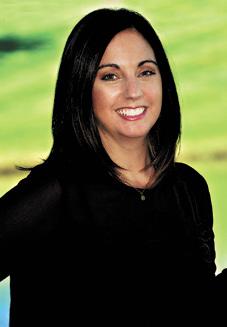
• Experience in accounting or bookkeeping, preferably for a parish.
• Excellent computer skills - specifically with Excel.
• Experience with ParishSOFT software - a plus.
“More than anything, it was just a great celebration of our school and our school community,” said Principal Chris Kloesz. “This was such a feel-good event ... Enrollment is up and people feel really good about our school. Everybody makes it happen.”
Kasey and Tyler were married at St. Pius X in 2019, and in 2020 Kasey completed her RCIA journey and was confirmed into the Catholic Church. In 2022, the couple celebrated their daughter Lindley’s baptism at the church. With a baby sister now on the way for Lindley, St. Pius X
Please send resume and salary history/requirements by to: Human Resources, Diocese of Charlotte, 1123 South Church Street, Charlotte, NC 28203-4003, or email to Recruiting@rcdoc.org
The Diocese of Charlotte is an Equal Opportunity Employer.
“Get
BELMONT — The Montcross Chamber of Commerce honored Regina Moody, the retired president of Holy Angels in Belmont, with the Harley B. Gaston Jr. Public Service Award at its annual awards celebration March 30 for her four decades of service and leadership.

The award is named for the late Harley B. Gaston Jr., a long time judge and community leader in Belmont. This award is not given annually, but the chamber board felt it was important this year to present the award to Moody following her 40 years of service at Holy Angels.
“We are honored to present the Harley B. Gaston Jr. Public Service Award to Regina Moody for her more than four decades of service, not only for the differently abled, but to scores of other initiatives and leadership contributions in Belmont and throughout Gaston County, as well as North Carolina,” said Marc Jordan, Montcross Chamber of Commerce’s president and CEO. “Regina’s legacy at Holy Angels is reflected in the joyful faces of the residents and the staff who turned to her for support and vision.”
Moody retired at the end of 2022 yet remains committed to the mission of Holy Angels, serving as president emeritus.
“It’s an honor for me to receive this award in honor of Harley B. Gaston Jr.,
who is a man I knew and respected so much,” Moody said. “Harley was a friend and supporter of Holy Angels, and we had the pleasure and privilege of serving his son Bo in some of our day activities. The impact Harley made in the Gaston community, especially in Belmont, was enormous.”
Gaston served on the Gaston County Board of Commissioners and was past president of the Belmont Chamber of Commerce. He received numerous awards for his public service, including the Order of the Long Leaf Pine, which is given to North Carolinians with a proven record of extraordinary service to the state.
This is the second year in a row that Holy Angels received the Harley B. Gaston Jr. award. In 2022, the public service award was presented to all local health care workers who fought on the front lines of the COVID-19 pandemic. Recipients included Holy Angels, CaroMont Health, Atrium Health and Kintegra Health.
Holy Angels was founded in 1955 by the Sisters of Mercy. The private, nonprofit corporation located in Belmont provides residential services and innovative programs for children and adults with intellectual developmental disabilities with delicate medical conditions. To learn more about Holy Angels, join Holy Angels caring team or volunteer, please call 704-825-4161 or visit Holy Angels’ website at www. holyangelsc.org.
SYLVA — Father James P. Cahill, 93, passed away Wednesday, April 19, 2023, at his residence.

A Mass of Christian Burial was celebrated Tuesday, April 25, 2023, at St. Margaret of Scotland Catholic Church in Maggie Valley. Inurnment followed at St. Margaret’s Columbarium.
A native of Philadelphia, Pa., he was born Sept. 12, 1929, the youngest child of the late Joseph and Helen (Hentschel) Cahill.
He earned a bachelor’s degree from Boston College before entering the Jesuits in 1947, studying at the adjoining Jesuit seminary, Weston College (now Weston Jesuit School of Theology) in Cambridge, Mass. He was ordained a priest on June 17, 1961, by Cardinal Richard Cushing, Archbishop of Boston.
He served in the Diocese of Charlotte for several years, first at St. Patrick Cathedral in Charlotte from 1986 to 1991, and then as pastor of St. Mary Mother of God Catholic Church in Sylva from 1991 until his retirement in 2002. He also served as vicar forane of the Smoky Mountains Vicariate, where he helped as needed in parishes.

Upon retirement, he gave the homily at the diocese’s annual priest jubilarian Mass, where he said a priest’s ministry is about sharing God’s love, peace and joy with others. “If I can take God’s peace and His love, and the joy of being with Christ, and convey that to another human being, I feel that my life as a priest is doing something remarkable.”
Those who knew Father Cahill knew he had a favorite phrase: “ORP,” or “old retired priest.”
In addition to his parents, Father Cahill was preceded in death by his siblings, one sister and two brothers.
Wells Funeral Home of Waynesville was in charge of the arrangements.
— Catholic News Herald

now more than ever. The $50,000 grant would cover the costs of reaching over 25,000 pro-life advocates with our training materials.”
— Spencer K.M. Brown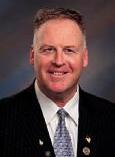
HIGH POINT — Oblates of St. Francis de Sales Father Peter Leonard, pastor, announced at Masses last weekend that he is leaving Immaculate Heart of Mary Parish in High Point to accept an assignment from his religious order to serve at another parish outside the Diocese of Charlotte.

Father Baiju Paul, OSFS, and Father Tom Norris, OSFS, continue to staff the High Point parish. The Oblates of St. Francis de Sales have administered IHM Parish since 1989.
— Catholic News Herald
CONCORD — Equal Rights Institute (ERI), a pro-life apologetics educational organization headquartered in Concord, was honored April 21 at the National Prayer Luncheon for Life annual awards ceremony. Recognized for training thousands of pro-life advocates to think clearly, reason honestly and argue persuasively, ERI is also a contender for a $50,000 grant to further its life-affirming work of preparing pro-life individuals to speak meaningfully, compassionately and productively about abortion with those who disagree.
“We are honored to be a finalist for the 2023 Pro-Life Impact Award and Grants,” said Josh Brahm, ERI’s president. “Since I started ERI, we’ve been dedicated to training pro-life advocates to think clearly, reason honestly, and argue persuasively about abortion. With the end of Roe, changing individual minds matters

JEFFERSON — Thanks to generous donations and volunteers from St. Francis of Assisi Church, residents at Margate Health and Rehab recently received an Easter basket and a special appearance from the Easter bunny.
 — Spencer K.M. Brown
— Spencer K.M. Brown
BELMONT — Greeted by a standing ovation in Belmont Abbey’s Haid Ballroom March 30, Nina Shea received the 2023 Benedict Leadership Institute (BLI) Award, joining past honorees such as Archbishop Charles Chaput and Justice Clarence Thomas.
Shea is a senior fellow and director of the Center for Religious Freedom at the Hudson Institute, where she advocates tirelessly for religious liberty all over the world. As a human rights lawyer of more than three decades, she
has taken repeated and concrete action to fight religious persecution and defend its victims. Among her many accomplishments, she helped to advance the International Religious Freedom Act of 1998, served as a commissioner for the U.S. Congressional Commission on International Religious Freedom, and is a member of the U.S. National Commission for the United Nations Educational Scientific and Cultural Organization (UNESCO).
Speaking to the Belmont Abbey community, she pointed out that “religious freedom is central to our culture,” relaying some of the horrifying realities of contemporary religious persecution all over the world, from Nigeria to China, Saudi Arabia to Nicaragua.
A Nicaraguan refugee priest who just received asylum in the U.S. in February bore witness from the audience as Shea urged her listeners to work against the kinds of regimes that imprison, exile or even murder clergy and laity alike. “Ora et labora,” she said – the prayer and work of active citizenship – must express our solidarity to those Christians and other religious minorities suffering for their faith in every part of the world. As the members of the BLI Executive Committee – Dr. WIlliam Thierfelder, Benedictine Abbot Placid Solari, Kevin Kennelly, Conor Gallagher and Robert Gallagher – stood to recognize Shea’s leadership, the more than 130 guests in attendance rose with them, in gratitude for the Benedictine spirit with which she has championed religious liberty throughout her distinguished career.
— Spencer K.M.
CHARLOTTE —
ASHEVILLE — Catholic Charities
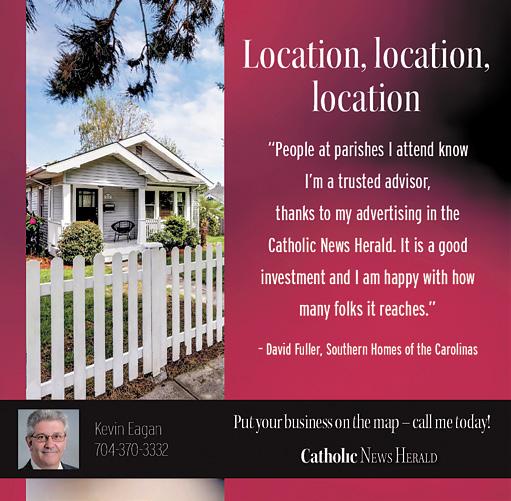 Brown
Brown
Diocese of Charlotte invites everyone to its annual Spirit of Hope fundraiser, which supports the work of Catholic Charities in the western region of the diocese. The event will be held Thursday, May 11, at the Double Tree by Hilton Asheville-Biltmore, located at 115 Hendersonville Road in Asheville. The evening will begin at 5:30 p.m. with drinks and hors d’oeuvres and dinner stations opening around 6:15 p.m. The event program will begin around 7 p.m.
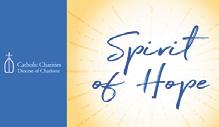
Parishioners of St. Matthew Church recently donated 75 large totes filled with food for Catholic Charities to distribute to Charlotte-area families in need this Easter season. Each tote contained food staples as well as a $25 gift card, enabling families to choose either a meat or vegetarian option. Additionally, families affected by homelessness, including veterans, received totes.
— Patricia L. GuilfoyleThe fundraiser is a critical source of support for Catholic Charities’ work in western North Carolina. At this year’s event, attendees will hear inspiring stories and be invited to make a financial gift to help Catholic Charities reach its fundraising goal of $100,000. These proceeds go directly to strengthening families, building communities and reducing poverty in the 12 westernmost counties of North Carolina.
To register to attend or to donate to Catholic Charities, go online to www. ccdoc.org.
— Catholic News Herald


CHARLOTTE — Monsignor Patrick Winslow, vicar general and chancellor of the Diocese of Charlotte, speaks to a group of St. Ann Parish homeschool students March 31 about Mary’s apparitions to three children in Fatima, Portugal, in 1917. He talked about what lessons Catholics today can learn from the messages of Our Lady of Fatima, who urged people to pray for sinners, foster devotion to the Immaculate Heart of Mary, and recite the rosary often. The students also received prayer cards and had the opportunity to venerate a relic of Sts. Jacinta and Francisco Marto, two of the Fatima visionaries and among the Church’s youngest saints.
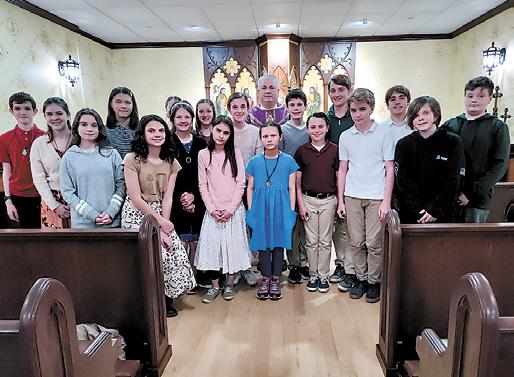 — Patricia L. Guilfoyle
— Patricia L. Guilfoyle
KERNERSVILLE — In just two years, Bishop McGuinness Catholic High School has been blessed with five endowments earmarked for tuition assistance for families who want to give their children a Catholic education.
Katie Williams, director of advancement at the high school, was instrumental in cultivating relationships that led to the establishment and growth of each of the five endowments. She said she’d like to be able to share the team’s recipe for success but admits they don’t have a “secret sauce.” It comes from the core elements of relationships, engagement and prayer, she said.
“The endowments are an important strategy in establishing sustainable financial stability that ensures that we can continue supporting the mission of Bishop McGuinness and Catholic schools in general in the Triad,” Williams added. “On a personal level, I feel so grateful to have had the time and the opportunity to work with people who are passionate about Catholic education in the way that I am.”
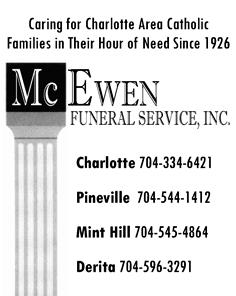
As the funds continue to grow in the endowments, 5% of the balance is available for distribution for tuition assistance each year. Because of the generosity of individuals and families, tens of thousands of dollars in assistance are available every academic year.
“Most of our families are sacrificing to send their children to our schools,” said Dr. Jared Rashford, head of school at Bishop McGuinness. “By supporting Catholic education both through annual giving and in particular through the establishment of endowments, our donors are ensuring the viability of that support for a longer period of time.”
Rashford noted that families, schools and the diocese experience increased costs every year.

CHARLOTTE — Students from Catholic schools across the diocese participated in the inaugural St. Jerome Book Battle April 21 at the Mecklenburg Area Catholic Schools Fine Arts Center in Charlotte. The quiz bowl-style competition is unique to the Diocese of Charlotte and was established by the Catholic Schools Office at the beginning of the 2022-’23 academic year. Charlotte’s St. Ann Catholic School won the fourth- and fifth-grade competition in the finals against Greensboro’s Our Lady of Grace Catholic School. Our Lady of Grace won the middle school competition in the finals against Charlotte’s Holy Trinity Catholic Middle School.
“In the age of overemphasis on technology and the digital, it’s wonderful to be able to prioritize timeless good and great books through our St. Jerome Book Battle,” said Dr. Greg Monroe, superintendent of Catholic schools. “Through this interscholastic competition, we partner with our wonderful schools and their great librarians to use this competition as a vehicle to build literary skills and unlock the imagination, grow knowledge and awareness of reality, and foster a love of reading in all students.”
Following this inaugural year, the Catholic Schools Office plans to open the competition to all dioceses who wish to participate, Monroe said.
He added, “I am grateful to all of those who led and participated in this initiative this year and look forward to many more good books being read in the future!”
— Annie Ferguson“We definitely do not want to pass the entirety of that increased cost onto our families,” he said. “We want to assume as much of the increase ourselves, and endowments and annual giving are definitely the way to be able to do that.”
In 2024, Rashford will shift roles to become president of Bishop McGuinness, and a new principal will be hired. As president, Rashford will focus on the school’s long-range planning, community relationships, financial management and fundraising. The new position will fund itself from the resulting increase in donations and community partnerships.
Founded in 1959, Bishop McGuinness has a total of nine endowments, eight of which provide tuition assistance. The five established since 2021 are:
n Mary Gay and Don Brady Endowment Fund: Created in March 2022 by the late Mary Gay and Don Brady, this fund provides for a tuition benefit to faculty
and staff at Bishop McGuinness and the Piedmont-Triad Area Catholic Schools to attend Bishop McGuinness High School.
n Sisters of St. Joseph Endowment Fund: Created in September 2021 from community donations in honor of The Sisters of Saint Joseph, who started and served Bishop McGuinness for more than 60 years, this fund provides for tuition assistance for students at Bishop McGuinness.
n George L. Repass Memorial Tuition Endowment Fund: Created in December 2021 from community donations in memory of the school’s beloved principal of 25 years, Mr. George L. Repass, this fund provides tuition assistance for a rising senior who applies and qualifies for aid.
n Bobby Grant Memorial Endowment Fund: Created in April 2022, this fund is in memory of Bobby Grant, friend, alumni parent, and the late husband of Trish Grant, a longtime assistant varsity girls basketball coach at the school. It provides tuition assistance for students at Bishop McGuinness who qualify for need-based aid.
n Archibong Family Endowment Fund: Created in May 2022 by a Bishop McGuinness alumnus to increase the minority population attending Bishop McGuinness, this fund provides tuition assistance for African American, indigenous or students of color who qualify for need-based aid.
“Our office encourages our parishes, schools and other entities to establish multiple endowments that can honor or remember donors or others,” said Jim Kelley, the diocese’s development director. “We hope that more parishes and schools will follow Bishop’s example and set up more endowments that will change lives.”
For the latest news 24/7:
Movie reviews
Forceful fact-based drama, set in 1984, charts the efforts of a marketing executive (Matt Damon) to rescue the failing basketball division of Nike by signing rookie Michael Jordan
and creating the Air Jordan brand. After winning over the company’s initially skeptical founder and CEO (Ben Affleck), he teams with the head of his department (Jason Bateman) and a co-worker (Chris Tucker) to foster the project and pitches the idea to Jordan’s irascible agent (Chris Messina). But the person he really needs to convince turns out to be the athlete’s wise and wary mom (Viola Davis). Affleck, who also directed, manages to build suspense despite the obviously well-known outcome of his story (scripted by Alex Convery). Viewers will be cheering his protagonist on as the visionary businessman uses ingenuity, innovative thinking and persistence to overcome long odds. The film’s macho milieu, however, is marked by relentless swearing, making this a fit choice for grown-ups only. A few uses of profanity, numerous milder oaths, pervasive rough and much crude language, an obscene gesture. OSV: A-III (adults), MPAA: R
Potentially enjoyable comic material is washed away by a flood of gore in this send-up of the horror genre. Nicholas Hoult plays the titular character, the longtime but increasingly disaffected assistant to Dracula (Nicolas Cage). As Renfield seeks to break free from his servitude and acquires a love interest in the person of a courageous New Orleans police officer (Awkwafina), screenwriter Ryan Ridley’s script riffs on the humorous comparison between his situation and that of people in more conventional unhealthy relationships. But both his struggle and his boss’ predations involve sickeningly

o er outpatient rehabilitation services in addition to our existing inpatient o erings. We take a multidisciplinary approach to healing and recovery by incorporating a personalized plan that includes physical, occupational and speech therapy. erapy services are available seven days a week, and progress is monitored daily.
rough language, numerous crude terms, an obscene gesture.
OSV: O (morally offensive), MPAA: R
After the pilot of the plane on which he’s traveling dies of a heart attack, a Louisiana pharmacist (Dennis Quaid) takes command of the craft, despite never having trained to fly such a vessel. He gets support from his wife (Heather Graham) on board as well as an aspiring air traffic controller (Rocky Myers) and experienced flier (Jesse Metcalfe) on the ground. But there are stormy skies to navigate. This fact-based drama has religious underpinnings yet any effective exploration of faith is blunted by its inept script and off-key tone. What remains, as directed by Sean McNamara and written by Brian Egeston, is mostly a testament to sweating it out, muddling through and improvising. Characters in danger, intense emotions, including scenes of mourning.
OSV: A-II (adults and adolescents), MPAA: PG
Animated origin story for the siblings of the title (voices of Chris Pratt and Charlie Day) dutifully accounts for various elements in the landmark video games in which they are featured. Magically transported to an alternate universe, the duo of Brooklyn plumbers become separated in the process, one landing in an upbeat realm ruled by a fetching princess (voice of Anya Taylor-Joy), the other in the dark domain of an evil turtle (voice of Jack Black), who is not only scheming to conquer the happier territory but to marry its sovereign as well. The occasional touch of humor and clever use of music aside, co-directors Aaron Horvath and Michael Jelenic’s adaptation amounts to little more than a frantic series of chases and showdowns. While free of any genuinely objectionable elements, the instantly forgettable proceedings might frighten little ones. Much stylized violence, including explosions and brawls, characters in peril.
OSV: A-II (adults and adolescents), MPAA: PG

e Lillian Congdon Transitional Rehab Center has 24 private, one-bedroom suites. e brand-new facility features ne dining, a state-of-the-art gym, Kore Balance for assessments, Never2Late for cognitive training and standing tolerance, an outdoor therapeutic space, POCket Pro for exercises at home and more.

In the spring of 2008 I was a senior in college sitting in the backyard of a little white rental house near campus and I was weeping because an old man in a book had made the sign of the cross.

I was reading “Brideshead Revisited” for my 20th-century novel class. I had been delighted by its colorful characters and the author Evelyn Waugh’s brilliant humor, but slightly confused about where the story was going or why the book was hailed as a Catholic masterpiece.

The Catholic characters all seemed to be a mess, with failed marriages and scandalous decisions and addictions they knew were wrong. They were bad Catholics, people who could barely hold on to the cultural trappings of their faith. They were haunted by their sins, but they didn’t even attempt to hide them under a veneer of respectability. As a lifelong Protestant, I wondered: If Catholicism is true, wouldn’t Catholics behave better? What I wasn’t prepared for was the flood of grace waiting to overwhelm my heart in the final pages.
“Brideshead Revisited” is about the lost sheep of the historically Catholic and wealthy Flyte family and is narrated by their friend, agnostic Charles Ryder (fiance to the Flyte’s oldest daughter, Julia). When the family congregates because of the final illness of their patriarch, Lord Marchmain, the specter of death becomes a catalyst of grace.
Following years of self-imposed exile after abandoning his devout Catholic wife, now deceased, for a life of “freedom” with an Italian mistress, Lord Marchmain returns to the family estate in England to die. After firmly refusing the sacraments from the local parish priest and claiming that he has “not been a practicing member of your Church for twenty-five years,” the old man’s health further declines. The two Flyte children still practicing, Cordelia and Bridey, desperately desire him to die in a state of grace, hoping he will not refuse last rites before he expires. But to Charles’ great surprise, Julia Flyte, who left the Church years ago, is also determined that her father should not die estranged from God.
Can’t the old man who has scoffed at the faith be left to die in peace? Charles wonders. Why would Julia, whose life seems to deny every doctrine of the Church she has abandoned, become anxious for the soul of her dying father? Surely she doesn’t think it’s all true? If Lord Marchmain is losing consciousness, what’s the point of performing the sacrament at all? And if the crux of the matter is a soul’s contrition, why is it so important that a priest shows up? It all baffles Charles, and he interrogates the family regarding this sudden obsession with the sacraments and Lord Marchmain’s soul.
Charles is shocked to discover that the family members and Cara, Lord Marchmain’s mistress, have varying levels of devotion and understanding of Church teaching, yet all seem to agree that the sacraments matter. Cara, who has lived in sin for decades with Lord Marchmain and cannot be criticized for scrupulosity, closes the question by saying simply that when her death comes, “All I know is that I shall
Sunday, April 30, 5:30-8 p.m. (TCM)
If the sacraments were real and powerful enough to change lives and restore lost souls, then the grace of God was waiting for me too. And I didn’t want to wait until my deathbed to receive it. Cordelia, the youngest Flyte daughter with the most charity and therefore the most clarity of vision, always has hope for her wandering siblings, knowing that “God won’t let them go for long, you know.” She compares the grace that will draw them home to an image from one of Chesterton’s Father Brown stories about a thief who has been caught by “an unseen hook and an invisible line which is long enough to let him wander to the ends of the world and still to bring him back with a twitch upon the thread.” I didn’t finish “Brideshead Revisited” and immediately sign up for RCIA. It wasn’t until a year later, when my son was born, that my husband and I were pushed across the Tiber by the desire for our firstborn to receive the sacrament of baptism. But Lord Marchmain’s holy death was a twitch upon the thread drawing my wandering heart, by God’s grace, closer to His mercy.
“The Killing Fields” (1984). Powerful and visually overwhelming movie about the friendship of an American correspondent (Sam Waterston) and his Cambodian assistant (Haing S. Ngor) set against the background of the fall of Cambodia and the slaughter of millions by the Khmer Rouge. Director Roland Joffe’s fact-based drama makes an extraordinary human document in the tragic history of an entire nation.
Tuesday, May 2, 8-11:05 p.m.
(Showtime) “Dances With Wolves”
(1990). Set in the Dakota Territory of the 1860s, the story centers on a soldier (Kevin Costner) at a deserted frontier fort who embarks on a voyage of self-discovery when he is befriended by a Sioux tribe and falls in love with a white woman (Mary McDonnell) adopted by them. Also directed by Costner, the film’s sensitive treatment of Native Americans, exceptional cinematography and fine performances compensate for its excessive three-hour-plus length. Much gory battlefield violence, minimal, restrained lovemaking and a flash of rear nudity.
Saturday, May 6, 8-11 p.m. (HBO)
take very good care to have a priest.”
How is it possible that these bad Catholics would still, despite their wandering, be compelled to believe?
Could the mark of baptism and the pull of sacramentals still draw them with the powerful residual effects of grace? With Cordelia and Bridey both absent, Julia makes the decision to call for the priest when it’s clear that Lord Marchmain is in his final hours. Charles watches the priest begins asking Lord Marchmain, who is too ill to speak, to give a sign that he is sorry for his sins and to receive God’s grace in the sacrament of the anointing of the sick.
Charles, despite his lack of faith, finds himself praying with Julia and Cara kneeling by the deathbed, “Oh God, if there is a God, forgive him his sins, if there is such a thing as sin.” His hostility to the faith is no match for the grace being poured out through a very ordinary priest in Lord Marchmain’s last rites. Once he is anointed Charles sees the old man bring a trembling hand to his forehead, and Charles worries that Lord Marchmain is about to obstinately wipe away the chrism oil in a final rejection of the Church. Instead, with his last ounce of strength, Lord Marchmain makes the sign of the cross.
This moment of grace will bring Julia back to her faith and bring Charles to it for the first time as he embraces prayers “ancient” and “newly learned.” But that powerful exhibition of grace didn’t just set their conversions in motion – it set mine in motion, too.
As I sat in my backyard weeping over a fictional character’s receptivity to God’s mercy, something clicked. Grace, sin, the sacraments, human failure and redemption – an indescribable awakening in my heart. I wanted that kind of powerful grace. I understood that the scandalous wandering of the Flytes was also my own wandering. Maybe my faults weren’t the cause of public scandal, but like the Flytes, I had chosen my sins over God, and like Charles, I was an outside observer being drawn against my will to the grace being offered me.
HALEY STEWART is the managing editor of Word on Fire Spark and the author of “The Grace of Enough, Jane Austen’s Genius Guide to Life,” and “The Sister Seraphina Mysteries.” She lives in Florida with her husband and four children. This article originally appeared on www.wordonfire.org.
“The Lord of the Rings: The Fellowship of the Ring” (2001). Visually splendid adventure tale set in the mythical realm of Middle-earth where a humble Hobbit (Elijah Wood), assisted by eight faithful companions (including Ian McKellen), embarks on a perilous quest to destroy a ring which possesses the ultimate source of dark power. Based on the first book of Catholic author J.R.R. Tolkien’s trilogy, director Peter Jackson’s fantasy is true to the epic struggle of good versus evil and uses magnificent effects and location shots.
Catholic Charities Week, which will be celebrated April 30 to May 6, highlights the tangible ways in which the faithful across western North Carolina are giving back to people in need –offering a glimmer of hope and inspiration to overcome the difficulties they are experiencing.
Catholic Charities is committed to helping our brothers and sisters who are struggling, living on the peripheries, the most vulnerable among us. For nearly 75 years, the agency has provided assistance and resources to strengthen families, build communities and reduce poverty in western North Carolina. Last year alone, Catholic Charities Diocese of Charlotte served more than 18,000 people, helping them address the residual effects of the COVID-19 pandemic and rising inflation that has created a greater need for food, housing and financial assistance.
Catholic Charities’ food pantries in Asheville, Charlotte and Winston-Salem are among its most in-demand services. Last year, the agency distributed more than 562,000 pounds of food to 13,515 people in need.
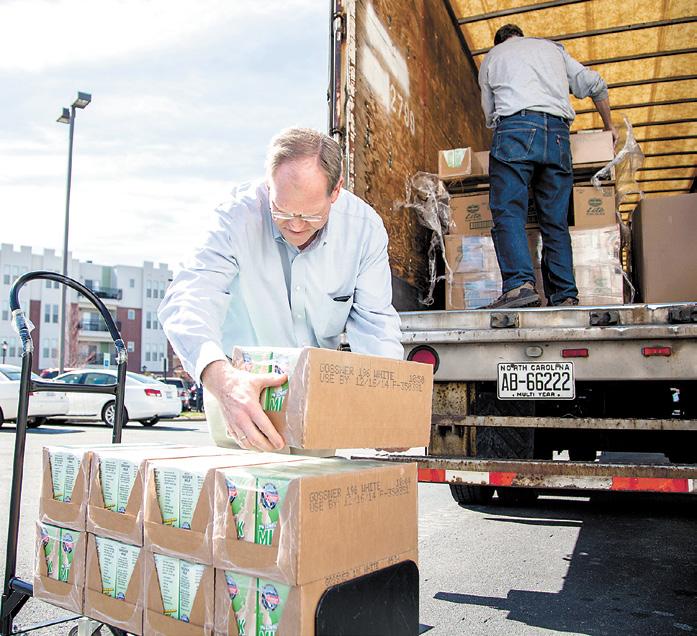
Agency staff and volunteers also provided people with a range of individualized support services designed to help them escape poverty – including educational and employment opportunities, help connecting to healthcare, parenting and life skills coaching, overcoming barriers to transportation and childcare, and more. (See related story on page 4.)
Catholic Charities also rose to the challenge in aiding people to flee war-torn Afghanistan and Ukraine, resettling more than 240 refugees in Charlotte and Asheville. They were among a total of 636 refugees from across the globe that Catholic Charities assisted throughout western North Carolina over the past year. They received financial, medical, educational, employment and housing assistance to enable them to build new lives.
Catholic Charities routinely offers a comprehensive array of services to meet the needs of our communities, including: pregnancy support and adoption services; individual, marriage and family counseling; support for teens in crisis; legal immigration services; disaster relief; help for homeless veterans and individuals; and social advocacy.
The agency also assists elderly individuals through its Elder Ministry, offering classes and workshops to address the needs and challenges of aging.
And all of these services are made available to people regardless of their race, ethnicity or religion.
Dr. Gerard Carter, executive director and CEO of Catholic Charities, credits the many volunteers, supporters and donors who make this work possible.
“We could not do what we do without their support and help,” he said. “It’s their care for people they’ve never met, who’ve never met them, who do not know their name, and whose name they’ll never know. But they reach out to help them because they are fellow human beings in need.”
n FFHL Catholic Charities Diocese of Charlotte Endowment Fund: Established through the “Forward in Faith, Hope, and Love” campaign, this fund provides financial support for Catholic Charities Diocese of Charlotte.
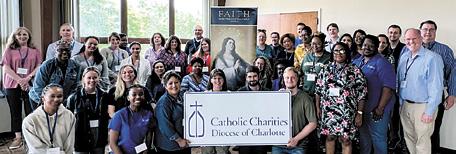
n Catholic Charities Endowment Fund: This fund provides for the general needs of this diocesan ministry across the western half of North Carolina.
n Catholic Charities Asheville Endowment Fund: This fund provides for the general needs of this ministry in Asheville.
n Catholic Charities Burial Assistance Endowment Fund: This fund provides for the burial assistance program in Mecklenburg County.
n Catholic Charities Charlotte Endowment Fund: This fund provides for the general needs of this ministry in Charlotte.
n Catholic Charities Refugee Endowment Fund: This fund provides for the general needs of this ministry across the western half of North Carolina.
n Catholic Charities Winston-Salem Endowment Fund: This fund provides for the general needs of this ministry in Winston-Salem.
n Beatrice A. Chase Endowment Fund: Established through a bequest, this fund provides financial support for Catholic Charities.
n Elizabeth Grace Endowment Fund: This fund provides for the programmatic needs of Catholic Charities in the Diocese of Charlotte.
n Aurelia I. Guffey Catholic Charities Endowment Fund: Established through a bequest, this fund provides for the programmatic needs Catholic Charities in the Diocese of Charlotte.
n Peter J. and Catherine P. Hickey Endowment Fund: This fund provides for the adoption programs of Catholic Charities.
n Robert H. Moeller Memorial Endowment Fund: This fund provides housing-related financial assistance for the elderly across the western half of North Carolina.
n John S. Monahan Endowment Fund: Established through a bequest, this fund provides for the general needs of Catholic Charities Diocese of Charlotte.
La Semana de Caridades Católicas, que se celebra del 30 de abril al 6 de mayo, destaca las formas materiales en que las personas del oeste de Carolina del Norte reciben ayuda, un rayo de esperanza e inspiración para superar las dificultades que atraviesan.
Caridades Católicas está comprometida a ayudar a nuestros hermanos y hermanas en necesidad: personas que luchan, viven en las periferias y son las más vulnerables entre nosotros. Durante 75 años, la agencia ha proporcionado asistencia y recursos para fortalecer familias, construir comunidades y reducir la pobreza en el oeste de Carolina del Norte. Solo el año pasado, Caridades Católicas de la Diócesis de Charlotte atendió a más de 18,000 personas, ayudándoles a enfrentar los efectos residuales de la pandemia de COVID-19 y el aumento de la inflación que ha creado una mayor necesidad de alimentos, vivienda y asistencia financiera.
La despensa de alimentos de Caridades Católicas en Asheville, Charlotte y Winston-Salem es uno de sus servicios más solicitados. Solo el año pasado, la agencia distribuyó más de 562,000 libras de alimentos a 13,515 personas necesitadas.
El personal y los voluntarios de la agencia también proporcionaron una gama de servicios de apoyo individualizados diseñados para ayudar a las personas a escapar de la pobreza, incluyendo oportunidades educativas y de empleo, ayuda para conectarse con beneficios de salud, asesoría en paternidad y habilidades para la vida, asistencia para superar barreras en transporte y cuidado de niños, y mucho más.
Caridades Católicas también aceptó el desafío de ayudar a los refugiados a huir de Afganistán y Ucrania, devastados por la guerra, reasentando a más de 240 personas en Charlotte y Asheville. Ellos eran parte de un total de casi 636 refugiados de todo el mundo que Caridades Católicas asistió en todo el oeste de Carolina del Norte durante el año pasado. Recibieron ayuda financiera, médica, educativa, de empleo y vivienda que les permitiera comenzar una nueva vida en Estados Unidos.
Además, Caridades Católicas ofrece rutinariamente una amplia gama de servicios adicionales para satisfacer las necesidades de nuestras comunidades, que incluyen: apoyo al embarazo y servicios de adopción; asesoramiento individual, matrimonial y familiar; apoyo a adolescentes en crisis; servicios legales de inmigración; ayuda en casos de desastre; asistencia a veteranos y personas sin hogar; y promoción social.
La agencia también ayuda a las personas mayores a través de su Ministerio del Adulto Mayor, que ofrece clases y talleres diseñados para abordar las necesidades y desafíos asociados con el envejecimiento.
Todos estos servicios están disponibles sin considerar raza, etnia o religión.
El Dr. Gerard Carter, director ejecutivo y CEO de Caridades Católicas, agradeció a los muchos voluntarios y donantes que hacen posible este trabajo.
“No podríamos hacer lo que hacemos sin su apoyo y ayuda. Es su cuidado por las personas que no conocen, que nunca han conocido, que no saben y nunca sabrán su nombre. Pero ellos se acercan para ayudarlos porque son seres humanos necesitados”.
Financial donations to enable Catholic Charities to assist participants and buy food are an effective way to help serve people in need. Make donations online at www.ccdoc.org (click on “Donate”), or by mail to: Catholic Charities, Central Processing, 1123 S. Church St., Charlotte, N.C. 28203-4003.
Catholic Charities offers services to people across western North Carolina. Email info@ ccdoc.org or reach out to your local Catholic Charities office:
Asheville
828-255-0146
Charlotte
704-370-3262
Greensboro
336-288-1984
Established needs of provides bequest, Diocese
n John and Marlene Olenick Endowment Fund: This fund provides support to Room At The Inn of Greensboro and the pregnancy support services of Catholic Charities in the Piedmont/Triad.
n George and Jane Pfaff Catholic Charities Endowment Fund: Established through a bequest, this fund provides for program needs of Catholic Charities in the Diocese of Charlotte.
n San Lorenzo Ruiz Philippine Heritage Endowment Fund: This endowment provides for the unrestricted general needs of Catholic Charities in Charlotte and for refugee/immigrant assistance of Catholic Charities in Charlotte.
n Respect Life Endowment Fund: Established through a bequest,
this fund provides for the respect life programs of Catholic Charities across the western half of North Carolina.
n Sarmiento-Lang Family Endowment Fund: This fund provides for the St. Vincent de Paul Food Pantry at St. Barnabas Church and for pregnancy support services at Catholic Charities across the Diocese of Charlotte.
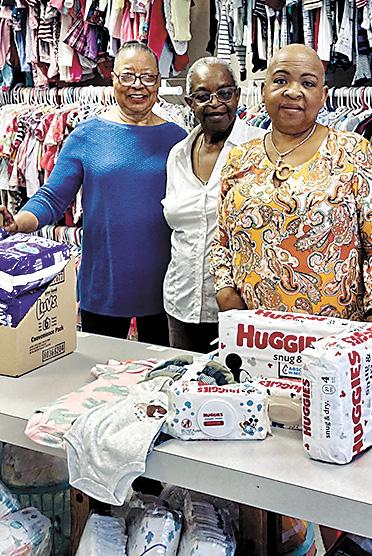
n Lee and Allan Thurbee Memorial Endowment Fund: This fund provides financial support for Catholic Charities’ work in the Diocese of Charlotte.
Lenoir
828-434-5710
Murphy
828-835-3535
Winston-Salem 336-727-0705
People who need assistance can also call 2-1-1 to find up-to-date information on available community services that may be available. 2-1-1 helps connect people to information about local food pantries, medical resources and possible changes to government benefits.
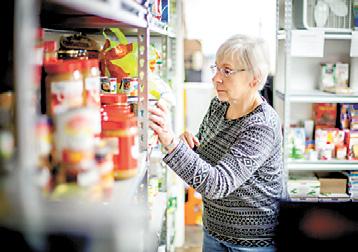
Las donaciones financieras para permitir que Caridades Católicas compre alimentos y ayude a los participantes son una forma efectiva de ayuda a las personas necesitadas. Puede realizar sus donaciones online en www.ccdoc. org (haga clic en “Donate”), o por correo a: Catholic Charities, Central Processing, 1123 S. Church St., Charlotte, N.C. 28203-4003.
Caridades Católicas ofrece servicios a las personas del oeste de Carolina del Norte. Envíe un correo electrónico a info@ccdoc.org o a alguna de nuestras oficinas locales de Caridades Católicas:
Asheville
828-255-0146
Charlotte
704-370-3262
Greensboro 336-288-1984
Lenoir
828-434-5710
Murphy
828-835-3535
Winston-Salem 336-727-0705
Las personas que necesiten asistencia también pueden llamar al 2-1-1 para encontrar información actualizada sobre servicios comunitarios disponibles.
El servicio 2-1-1 ayuda a conectar a las personas con información sobre despensas de alimentos locales, recursos médicos y posibles cambios de beneficios gubernamentales.
La trayectoria es clara. A medida que la población hispana crece de manera rápida y firme, cada vez son menos los hispanos que se identifican como católicos. Cerca de 63 millones de hispanos vivimos en los Estados Unidos.
El 13 de abril de 2023, el Centro de Investigación Pew actualizó sus cálculos reportando que cerca del 43% de todos los adultos hispanos en los Estados Unidos se identifican como católicos. Sólo una década atrás, en el 2010, ese cálculo era del 67%. El declive es alarmante.
Contrario a lo que muchas personas piensan, la mayoría de los hispanos que dejaron de identificarse como católicos no se unen a comunidades protestantes o a otras tradiciones religiosas. Un buen número de ellos lo hacen, ciertamente, y muchos lo hacen buscando lo que no encontraron en la religión de su infancia, o al menos en la institución que la regula.
Cerca de un 30% de los adultos hispanos no están afiliados a una tradición religiosa en particular. La mayoría de ellos crecieron como católicos. Otro hecho que nos ha de alarmar.
Durante el último medio siglo, entender y acoger la experiencia hispana ha sido un camino de muchos altibajos para la Iglesia Católica en los Estados Unidos. Los hispanos pasamos de ser cerca de un 10% de la población católica a ser la mayor fuente de vitalidad demográfica para nuestra Iglesia. Actualmente cerca de la mitad de todos los católicos en el país somos hispanos.
Durante los años ochenta y noventa, la migración desde América
Latina y el Caribe fue la mayor fuente de crecimiento de la población católica hispana. Su presencia naturalmente alteró la balanza demográfica del catolicismo estadounidense.
Cuando la mayoría de hispanos eran católicos, agentes pastorales en todos los niveles, desde obispos hasta párrocos y catequistas, percibieron a esta población como una gran oportunidad para renovar e inyectar vida nueva a comunidades de fe y a estructuras eclesiales. Todavía se sigue pensando de esta manera.
Los hispanos somos una fuente de vitalidad para el catolicismo estadounidense. Lo somos especialmente cuando observamos que la población católica euroamericana de raza blanca envejece rápidamente y sus números decrecen; también cuando vemos que la presencia católica disminuye en partes del país en donde el catolicismo definió contundentemente las culturas locales.
Pero la recepción positiva de esta presencia no siempre ha sido unánime. Existen focos de resistencia entre algunos católicos que ven el crecimiento rápido de los hispanos como una amenaza.
El resistir y el no actuar ante la oportunidad de acoger la bendición de una población católica joven, dinámica y profundamente católica, e integrarla en todas nuestras estructuras eclesiales, incluyendo parroquias, escuelas y organizaciones, han llevado una inversión insuficiente en la evangelización y retención de millones de católicos hispanos.
Cuando la mayoría de hispanos era católicos, se asumió que las cosas no cambiarían mucho y se hizo poco por cultivar a esta población.
El hecho de que sólo 4 de 10 adultos hispanos se identifique como católicos cambia las reglas de juego y exige nuevas conversaciones. La mayoría de niños hispanos que nazcan de ahora en adelante en los Estados Unidos no crecerán en hogares católicos.

Hace poco el equipo de investigación del Quinto Encuentro Nacional de Pastoral Hispana/Latina, bajo los auspicios de la Conferencia de Obispos Católicos de los Estados Unidos, calculó que en 2021 habían cerca de 31 millones de católicos hispanos viviendo en nuestro país. Éste es un signo de esperanza. No desperdiciemos la oportunidad de cultivarlos y retenerlos.
DR. HOSFFMAN OSPINO es profesor de teología y educación religiosa en Boston College.
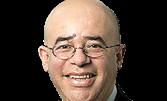
En la entrega del reconocimiento en la parroquia Nuestra Señora de Guadalupe aparecen, de izquierda a derecha, Bryan Mackihan, diputado de distrito; JC Riner, anterior diputado del estado; Pablo Morera, anterior Gran Caballero de la parroquia; y Chris Losack, actual diputado del estado.

CHARLOTTE — Con la entrega de la placa de “Diez Estrellas”, la distinción nacional más alta jamás recibida por ningún Consejo de los Caballeros de Colón en el estado de Carolina del Norte, el Consejo 17501 de la parroquia Nuestra Señora de Guadalupe fue reconocido por su excelente labor y compromiso durante una Misa y ceremonia celebrada a fines de marzo en Charlotte.
Para hacer entrega del premio, una delegación de 8 oficiales del estado de Carolina del Norte se hizo presente para participar de la ceremonia Samuel Llanas Castillo, Gran Caballero a cargo del Consejo en esa parroquia, dijo que el galardón corresponde al año fiscal que concluyó en junio de 2022 y premia al Consejo que cumple de manera extraordinaria las expectativas en las cuatro áreas de programas que requieren los Caballeros, a saber en la familia, la comunidad, promoción de la defensa a la vida, y actividades de la misma fraternidad.
Los Caballeros de Colón iniciaron actividades en 2020, en plena pandemia de COVID-19, gracias a la intervención del Padre Gregorio Gay, entonces párroco, quien conocía del importante trabajo de asistencia de esta agrupación.
El crecimiento inicial, reconoce Llanas, fue difícil, pero “en nuestro Consejo se integraron 41 familias el año pasado, lo que ya hace un total de 130 familias participantes en la parroquia”.
Respecto al Consejo 17501, Llanas destacó que se trata del primero completamente en español en todo Estados Unidos.
En Carolina del Norte existen 150 Consejos que integran un aproximado de 20 mil miembros. Llanas dijo que todos los trabajos que realizan los Caballeros de Colón se rigen por cuatro principios.
“Caridad, puesto que los Caballeros reconocemos que nuestra misión y nuestra fe en Dios nos impulsan a la acción, ayudando a los necesitados; unidad, ya que juntos podemos lograr mucho más de lo que cualquiera de nosotros podría lograr individualmente; fraternidad, brindando asistencia a las viudas y niños que quedan desprotegidos cuando el sostén de la familia muere; y patriotismo, ya que estamos orgullosos de nuestra devoción a Dios y al país, y creemos en defender a ambos”.
Para ser Caballero de Colón, el solicitante debe ser mayor de 18 años y católico practicante. “Es exclusivamente para hombres, pero toda la familia se beneficia. De hecho es el único grupo que realiza actividades que integra a toda la familia”, explicó Llanas
Los Caballeros de Colón fueron fundados en 1882 por el Padre Michael J. McGivney, vice párroco de la Iglesia Santa María en New Haven, Connecticut, quien vio la necesidad de la comunidad inmigrante irlandesa que quedaba desamparada al fallecer inesperadamente el cabeza de familia.
Durante la Misa que celebró el Padre Hugo Medellín, vicario, el Diácono Eduardo Bernal mencionó en su homilía que más del 90 por ciento de los funerales que se celebran en la parroquia son de personas que, al morir en la plenitud de su vida, dejan familias desamparadas.
Llanas afirma que la situación migratoria ha cambiado y hoy la fuerza laboral ya no viene de Europa sino de América Latina, “y gracias a los seguros de vida y planes de retiro se puede dar seguridad a los familiares de los miembros”.
“A lo largo de nuestros tres años de actividades, ya son dos hermanos los que han fallecido y la familia pudo recibir la ayuda de la fraternidad. Ya se ven los frutos del trabajo en nuestra comunidad”, finalizó.
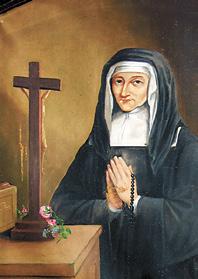
Una tarde cultural con música, danzas folclóricas y platillos típicos se ofreció en la apertura de las celebraciones. A la izquierda, las flamantes Hijas de la Virgen, Glendy Ortiz Gamas y Sheila Marisol Rodriguez Macario, que reemplazan a las salientes Yésica Pérez López y Yeny Selina Vásquez Rodríguez.
FOTOS COMUNIDAD LA ENCARNACIÓN
CÉSAR HURTADO rchurtado@charlottediocese.org
MORGANTON — Una noche cultural, celebrada el pasado viernes 14 de abril en el Centro de Recreación de esta ciudad, fue el preámbulo de la Fiesta de la Encarnación que anualmente conmemora la comunidad migrante guatemalteca a su patrona, la Virgen de la Encarnación, una advocación mariana muy arraigada en el departamento de Huehuetenango, limítrofe con la frontera sur de México.
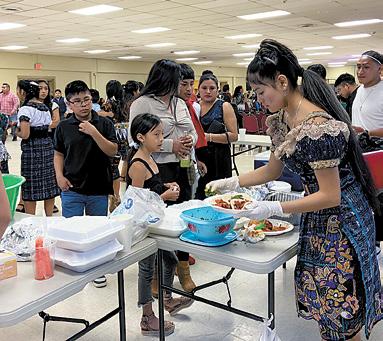
Bailes folclóricos, música, comida tradicional y refrescos típicos se ofrecieron durante la velada cultural en la que también fueron presentadas las Hijas de la Virgen, dos jóvenes guatemaltecas, Glendy Ortiz Gamas y Sheila Marisol Rodriguez Macario, que reemplazan a las salientes Yésica Pérez López y Yeny Selina Vásquez Rodríguez, y tendrán la responsabilidad de representar a su comunidad en eventos religiosos y públicos.
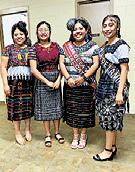
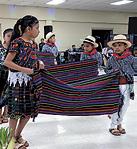
La velada inició a las 6:30 de la tarde y concluyó pasadas las 9 de la noche. La bendición de apertura del Padre Kenneth Whittington, párroco de la Iglesia San Carlos Borromeo, fue seguida por un mensaje del Diácono Darío García, coordinador del Ministerio Hispano del Vicariato de Hickory, quien invitó a la comunidad a mantener y valorar su cultura, tradiciones familiares y folclor.
La fiesta siguió el viernes 21 de abril con una Misa de Víspera y la presencia del Coro Renacimiento en Cristo. El viernes 28 de abril, de 7 a 9 de la noche, se da apertura formal a la celebración con un recital del Coro San Francisco Javier.
El sábado 29 a las 6 de la mañana se cantan las Mañanitas a la Virgen, para luego, a las 10 de la mañana, celebrar la Santa Misa en honor a la Virgen de la Encarnación. Posteriormente, a las 12:30 p.m. se realiza un festival.
Los eventos concluyen el mismo 29 a las 4:30 p.m. con un concierto de alabanza, prédica y Hora Santa en la Escuela Media Walter Johnson, 701 Lenoir Rd, Morganton, NC 28655.
Chanita Vicente, miembro de la comunidad La
ABRIL 30-MAYO 6
Domingo: Hechos 2:14a, 36-41, 1 Pedro 2:20b-25, Juan 10:1-10; Lunes (San José Obrero): Hechos 11:1-18, Juan 10:11-18; Martes (San Atanasio): Hechos 11:19-26, Juan 10:22-30; Miércoles (Santos Felipe y Santiago, Apóstoles): 1 Corintios 15:1-8, Juan
14:6-14; Jueves: Hechos 13:13-25, Juan 13:16-20; Viernes: Hechos
13:26-33 Juan 14:1-6; Sábado: Hechos 13:44-52, Juan 14:7-14
Encarnación y colaboradora de Radio Alégrate María de Generación en Generación, una estación radial por internet que transmite la fe mariana desde Morganton, dijo sentirse emocionada pues “es como que estuviéramos en nuestro pueblo porque se hacen las novenas, las mañanitas a la Virgen, la Santa Eucaristía, el almuerzo y los bailes folclóricos”.
La imagen de la Virgen de la Encarnación llegó a la parroquia San Carlos Borromeo en 1996, durante la visita del Padre Gabriel Rodriguez, entonces párroco de la Iglesia Nuestra Señora de la Encarnación en Aguacatán, Huehuetenango.
En 2000 se realizó la primera fiesta en honor a la Virgen, “que nos muestra el camino a Jesús, nos conduce y enseña cómo llegar al amor de Cristo”, precisó la Sra. Vicente.
La Misa central del sábado será oficiada por el Cardenal Álvaro Ramazzini, Obispo de la Diócesis de Huehuetenango, especialmente invitado para recibir el homenaje de su congregación migrante.
El Cardenal Ramazzini fue ordenado sacerdote en junio de 1971, en la Catedral de Guatemala por el entonces Arzobispo Mario Casariego. En diciembre de 1988, el Papa Juan Pablo II lo nombró Obispo de San Marcos.
El Cardenal Ramazzini es conocido como un luchador por la justicia social, especialmente por los indígenas, lo que le ha valido recibir amenazas de muerte debido a su trabajo, a la par de cartas oficiales de apoyo del Vaticano y la Conferencia de Obispos Católicos de Estados Unidos.
El 14 de mayo de 2012, fue nombrado obispo de Huehuetenango. En 2022 presentó su renuncia al haber cumplido los 75 años. El Papa Francisco rechazó su solicitud y solicitó que siguiera al frente de su diócesis, lo que el cardenal aceptó con agrado.
En www.facebook.com/CNHEspañol : Vea más fotografías y videos sobre esta noche cultural
Nació en Francia el 12 de agosto de 1591. Huérfana a los 14 años, sintió un fuerte deseo de convertirse en religiosa, pero por su delicada salud y débil constitución no fue admitida. Se casó con Antonio Le Grass, secretario de la reina de Francia, María de Médicis, convirtiéndose en un modelo de esposa. Con su bondad y amabilidad logró transformar a su consorte que era duro y violento. Dios le concedió un hijo, a quien amó e inculcó una sólida fe católica desde pequeño.
A los 34 años falleció su esposo, y decidió entonces consagrar su vida al servicio de Dios.
Esta santa mujer tuvo la dicha inmensa de tener como directores espirituales a dos santos muy famosos, San Francisco de Sales y San Vicente de Paúl. Con San Francisco de Sales tuvo frecuentes conversaciones espirituales en París en 1618 (tres años antes de la muerte del santo) y con San Vicente de Paúl trabajó por treinta años, siendo su más fiel y perfecta discípula y servidora.
San Vicente de Paúl había fundado grupos de mujeres que se dedicaban a ayudar a los pobres, atender a los enfermos e instruir a los ignorantes. Estos grupos de caridad existían en los numerosos sitios en donde San Vicente había predicado misiones, pero sucedía que cuando el santo se alejaba los grupos disminuían su fervor y su entusiasmo, haciéndose necesaria la presencia de alguien que los coordinase y animase permanentemente. Dicha persona providencial fue Santa Luisa de Marillac, quien personalmente se ofreció para coordinar y dirigir a los grupos de caridad. La santa recorrió el país visitando las asociaciones de caridad, llevándoles gran cantidad de ropas y medicinas para entregar a los más necesitados.
En marzo de1633, bajo la dirección de Santa Luisa, cuatro jóvenes hacen votos de pobreza, castidad y obediencia, naciendo así la más grande comunidad femenina que existe, las Hermanas Vicentinas, Hijas de la Caridad.
La santa escribió muchos textos donde recopiló las enseñanzas de San Vicente de Paúl y reflexiones personales, constituyendo una extraordinaria riqueza para la vida espiritual de sus religiosas y de todas las personas en general.
Falleció el 15 de marzo de 1660, después de sufrir una dolorosa enfermedad.
Las 33,000 religiosas vicentinas o hijas de la Caridad tienen más de 3,300 casas en el mundo. En la casa donde está sepultada su fundadora, en París, sucedieron las apariciones de la Virgen de la Medalla Milagrosa a la vicentina Santa Catalina Labouré.
Las religiosas fundadas por Santa Luisa se dedican exclusivamente a obras de caridad.
El Papa Pío XI declaró santa a Luisa de Marillac en 1934, y el Papa Juan XXIII la declaró Patrona de los Asistentes Sociales.
— Condensado de ACI Prensa
MAYO 7-13
Domingo: Hechos 6:1-7, 1 Pedro 2:4-9, Juan 14:1-12; Lunes: Hechos 14:5-18, Juan 14:21-26; Martes: Hechos 14:19-28, Juan
14:27-31; Miércoles (San Juan de Ávila): Hechos 15:1-6, Juan
15:1-8; Jueves: Hechos 15:7-21, Juan 15:9-11; Viernes (Santos Pancracio, Nereo y Aquileo, mártires): Hechos 15:22-31, Juan
15:12-17; Sábado (Nuestra Señora de Fátima): Hechos 6:1-10, Juan 15:18-21
MAYO 14-20
Domingo: Hechos 8:5-8, 14-17, 1 Pedro 3:15-18, Juan 14:1521; Lunes: Hechos 16:11-15, Juan 15:26-16:4; Martes: Hechos 16:22-34, Juan 16:5-11; Miércoles: Hechos 17:15-16, 22–18:1, Juan
16:12-15; Jueves (San Juan I, Papa y mártir): Hechos 18:1-8 Juan 16:16-20; Viernes: Hechos 18:9-18, Juan 16:20-23; Sábado: Hechos 18:23-28, Juan 16:23-28
Black Catholic religious vocations emerge from a long tradition of faith, nurtured by silence and prayer within the life of the church, said a religious sister at an event dedicated to those vocations.
“I stand on the shoulders of giants. … Vocations grow; they don’t just happen,” said Sister Mary Francis Bard, a member of the Sisters of the Holy Family, in an April 23 reflection for the National Day of Prayer for Black Vocations.
The online gathering – moderated by Nate Tinner-Williams, co-founder and editor of Black Catholic Messenger and a Josephite seminarian – was sponsored by the National Black Catholic Seminarians Association, which established the observance in 2010. Founded in 1970, the nonprofit NBCSA, an affiliate of the National Black Catholic Clergy Caucus, supports Black Catholic seminarians preparing for priesthood and religious life in the U.S.
The day of prayer is annually held on the Sunday closest to the ordination
The Diocese of Charlotte is seeking a full time Assistant Controller. This position supervises three to four staff members and reports to the Financial Controller. Responsibilities include accounting for the Diocesan Central Administration and its affiliated entities.
ESSENTIAL FUNCTIONS:
• Oversight of monthly financial closings and general ledger entries.
• Preparation of the annual financial statement and disclosures.
• Assist with the annual audit process.
• Coordinate preparation and review of sales and use tax filings.
• Oversee the Accounts Payable process.
• Supervise the recording of cash receipts.
• Participate and assist with annual budget procedures.
• Understand and oversee activities related to Fund Accounting
• Supervise, train, and evaluate staff members.
• Aide in the preparation of various tax returns
EDUCATION, EXPERIENCE AND SKILLS REQUIRED:
• Bachelor’s Degree in Accounting, Finance or related field, CPA required.
• Five Years’ experience in accounting and/or internal auditing.
• Thorough knowledge of budgeting principles and practices, internal control systems, tax related legislation, treasury management, financial reporting methodologies, and of generally accepted accounting principles (GAAP) as promulgated by the Financial Accounting Standards Board (FASB).
• Strong verbal, written and analytical skills.
• Proficiency with computers, word processing, spreadsheet software, accounting software and Windows.
Please send resume and salary history/requirements by to: Human Resources, Diocese of Charlotte, 1123 South Church Street, Charlotte, NC 28203-4003, or email to Recruiting@rcdoc.org.
The Diocese of Charlotte is an Equal Opportunity Employer.
anniversary of Venerable Augustus Tolton (1854-1897), a former slave who became the first known Black Catholic priest from the United States. Rejected by Catholic seminaries in the U.S. because of his race, Tolton entered formation at the Pontifical Collegium Urbanum de Propaganda Fide in Rome, and was ordained there in 1886 at St. John Lateran Basilica. He returned to the U.S. to serve in Chicago.
Father Tolton’s parents, both Catholic, were instrumental in fostering his faith –particularly his mother Martha Jane who was left to raise Tolton and his siblings after his father died while serving in the Union Army during the Civil War.
“(Religious vocations) come from families,” said Sister Mary Francis, the first woman religious invited to address the annual prayer gathering. “Nobody has a perfect family, but (vocations) come from families.”
In addition, vocations derive “from vibrant parishes, and dynamic schools, colleges and universities,” said Sister Mary Francis, who serves at the New Orleans motherhouse of the Sisters of the Holy Family, a historically Black religious community.
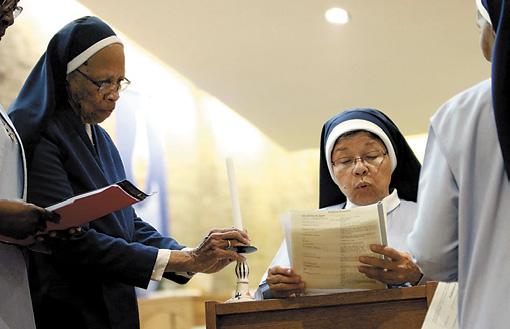
“All vocations are born out of prayer,” she said, including the “prayers from a mother, or a blessed grandmother and even a trusted friend – a simple, cherished prayer that we remain faithful to our God and faithful to our church.”
Both “sacred Scripture and the lives of the saints confirm that God calls all kinds of people” to religious life, regardless of skin color, she stressed.
“I refuse to believe God does not call people that look like me,” said Sister Mary Francis, who is Black. She said she had encountered individuals in religious life who “didn’t know any African American nuns or African American priests or sisters
or brothers.”
According to the Center for Applied Research in the Apostolate (CARA) at Georgetown University in Washington, only 4% of the ordination class of 2022 in the U.S. were Black, African or African American. A CARA study from 2021 estimated just 4% of women and men entering religious life in the U.S. since 2005 were Black or African, with the majority –82% – having been born overseas.
Sister Mary Francis, who entered her congregation in 2012, is considered to be the only living person from her native Kentucky area to enter a historically Black religious community. Her congregation was founded by Venerable Henriette Delille (1813-1862), a free woman of color who was born and raised in New Orleans.
Discerning a religious vocation requires a willingness to cultivate stillness and a humble openness to hearing from God, said Sister Mary Francis.
“You hear God in the quiet,” she said, describing how her own recognition of a call came amid an extended vacation to the African nation of Cameroon.
“I was in a cocoa field, being a typical ‘First World’ woman complaining about nothing,” she admitted. “And you know what God told me? You’re not getting married. … You’re going to serve your people and you’re going to serve my people. And I’m going to show you that I will be enough.”
Sister Mary Francis said she “had two choices that day: Was I going to run from God? Or was I going to embrace God?”
She chose the latter, she said, and hopes to “live up to the words” of Mother Delille, whom she quoted at the conclusion of her reflection.
“I believe in God. I hope in God. I love. I want to live and die for God,” the foundress said.
For the latest news 24/7: catholicnewsherald.com
WASHINGTON, D.C. — The U.S. Supreme Court said April 21 it would block a lower court’s restrictions on an abortion pill, leaving the drug on the market while litigation over the drug proceeds. The court’s order was an apparent 7-2 vote, with Justices Clarence Thomas and Samuel Alito publicly dissenting. The decision froze a lower court’s ruling to stay the U.S. Food and Drug Administration’s approval of the drug. The Justice Department and a pharmaceutical company that manufactures the abortion pill mifepristone previously asked the Supreme Court to intervene in the case after an appeals court allowed portions of the ruling by U.S. District Judge Matthew Kacsmaryk to take effect. A coalition of pro-life opponents of mifepristone, the first of two drugs
used in a medication or chemical abortion, had filed suit in an effort to revoke the FDA’s approval of the drug, arguing the government violated its own safety standards when it first approved the drug in 2000. However, proponents argued mifepristone poses statistically little risk to women using it for abortion early in pregnancy, and claim the drug is being singled out for political reasons. In an April 21 statement, President Joe Biden said he would continue “to stand by FDA’s evidence-based approval of mifepristone, and my Administration will continue to defend FDA’s independent, expert authority to review, approve, and regulate a wide range of prescription drugs.” On April 22, Bishop Michael F. Burbidge of Arlington, chairman of the USCCB’s Committee on Pro-Life Activities, called the Supreme Court’s interim order “a tremendous disappointment, both for the loss of innocent preborn life from chemical abortion, and for the danger that chemical abortion poses to women.”

WASHINGTON, D.C. — Pope Francis has accepted the resignation of Bishop Ronald W. Gainer of Harrisburg, Pennsylvania, who is 75, and has appointed Auxiliary Bishop Timothy C. Senior of Philadelphia to succeed him. Bishop
The DSA provides funding for 50 ministries and programs. Christ throughout the diocese to do the Lord ’s work – works of love and service that no one individual or parish can do alone.
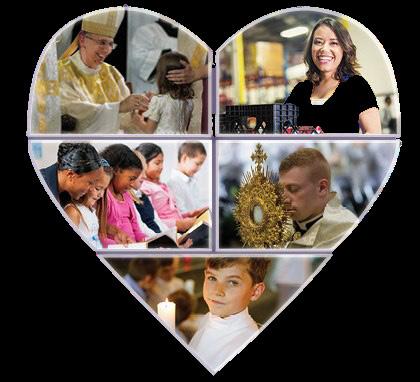

ONLINE: CharlotteDiocese.org/dsa
MAIL: Mail pledge card to diocese or contact your parish office
CALL: Make a gift over the phone 704 -370- 3302
Gainer, who has headed the Harrisburg Diocese since 2014, turned 75 last August, the age at which canon requires bishops to submit their resignation to the pope. Bishop Senior, who turned 63 March 22, has been a Philadelphia auxiliary since 2009. He also is rector emeritus of the archdiocese’s St. Charles Borromeo Seminary. The 15-county Harrisburg Diocese covers 7,660 square miles and has a Catholic population of about 206,000 out of a total population of just over 2.3 million people.
TALLAHASSEE — Florida Gov. Ron DeSantis signed a bill April 20 that will eliminate the state’s requirement that juries in capital punishment cases agree unanimously to recommend death sentences. The legislation, which has met criticism from the state’s bishops, lowers the number of jurors needed to hand down a death sentence to the lowest threshold of any U.S. state, from 12 to eight. On his approval of the legislation, DeSantis said, “Once a defendant in a capital case is found guilty by a unanimous jury, one juror should not be able to veto a capital sentence.” In an April 13 statement after the Florida Legislature passed the legislation, Michael Sheedy, Florida
Catholic Conference executive director, called it “stunning” that lawmakers “would weaken a common-sense law passed just six years ago that required unanimous agreement by a jury in order to sentence someone to death.”
WASHINGTON, D.C. — The Church in the U.S. has made progress over the past two decades in confronting sexual abuse against minors within the church, but has only begun to address the vulnerability of adults to sexual abuse by clergy, religious and lay leaders, experts said. “We’ve accomplished a tremendous amount in the area of (creating) safe environments,” said Suzanne Healy, chairwoman of the USCCB’s National Review Board, a lay-led group that advises the bishops on preventing sexual abuse of minors. At the same time, “there’s still a lot more work to be done” in extending safeguards to adults, she said. The newly revised papal reform, “Vos Estis Lux Mundi,” which specifically includes “vulnerable adults,” presents “a new frontier” for the church, said Deacon Bernard Nojadera, executive director of the USCCB’s Secretariat of Child and Youth Protection. — OSV News
QR CODE:

VATICAN CITY — The Vatican announced April 26 that there will be laypeople participating as voting members in the Synod on Synodality’s October assembly, a break with past custom, which allowed laypeople to participate without the right to vote.
Pope Francis will also approve every member in advance.
The general assembly of the Synod on Synodality will take place in two sessions, in October 2023 and October 2024.
After the vote on a final document for the assembly, the pope alone decides whether to take any actions based on the recommendations in the final text or whether to adopt it as an official Church document.
The leadership of the synod released information in a FAQ sheet April 26 about who will attend the 16th Ordinary General Assembly of the Synod of Bishops in October and how they will be chosen.
The biggest change announced Wednesday was the removal of the “auditor” role. In past synods, auditors included priests and religious, and laypeople who did not have the right to vote in synod deliberations.
Now, these 70 members, who may be priests, consecrated women, deacons and laypeople, will be able to vote. They will be chosen by the pope from among a list of 140 people selected by the leadership of this year’s continental synod meetings.
According to the synod leadership, it is requested that “50% of (the selected people) be women and that the presence of young people also be emphasized.”
“In selecting them, account is taken not only of their general culture and prudence but also of their knowledge, both theoretical and practical, as well as their participation in various capacities in the synod process,” the FAQ sheet says.
A second change states that five women religious and five men religious will be elected to represent their institutes of consecrated life, rather than 10 religious priests as in the past.
The last modification is that Pope Francis will personally choose the representatives of the Vatican dicasteries who participate in the assembly.
“It’s a change, but it’s not a revolution,”
Cardinal Jean-Claude Hollerich, relator general of the Synod on Synodality, told
journalists during a meeting to explain the changes April 26.
“Change is normal in life, in history,” he added.
Approximately 21% of the total participation, expected to be 370 people, will be non-bishops, Hollerich explained.
Cardinal Mario Grech, the secretary general of the Synod of Bishops, said the non-bishop participants – among them priests, religious, deacons and laypeople – “are witnesses of the memory of the process, of the itinerary, of the discernment that began two years ago.”
Grech said after the meeting that the synod of bishops has asked the presidents of the continental assemblies, which took place this spring, and the leadership of the Eastern Catholic Churches, to each submit a list of 20 people: 10 men and 10 women. From these lists, Pope Francis will choose 10 members.
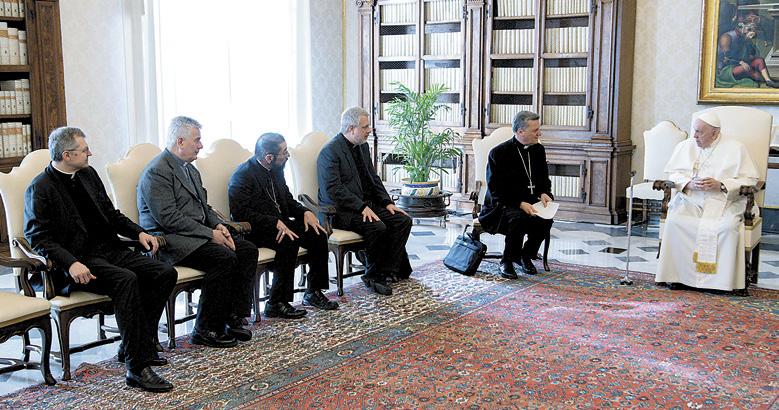
He said the decision to include laypeople
as full members does not “undermine” the nature of the synod as a meeting of bishops.
“It will remain a synod of bishops,” he said, “but it enriches all of the Church” to have the participation of others.
The process for electing the bishops to represent the various countries will remain the same, with one small addition, Hollerich said.
Previously, countries too small to have a bishops’ conference did not have a representative at the synod, he said. Now they will each send one bishop.
The other bishops will be elected by their bishops’ conferences. The number of bishop representatives for each country is determined based on the size of the bishops’ conference. Pope Francis must also ratify the elections of bishops as members of the synod assembly.
There will also be participants with a nonvoting capacity who are experts,
Sponsored by the Knights of Columbus www.kofcnc.org
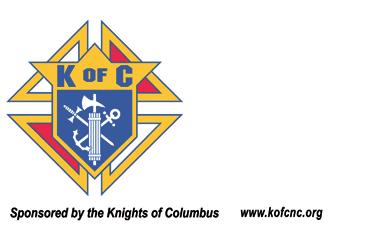
facilitators and fraternal delegates from non-Catholic faiths.
The norms regulating synods of bishops were updated by Pope Francis in 2018 in the apostolic constitution “Episcopalis Communio” (“Episcopal Communion”).
According to the FAQ sheet from the Secretariat of the Synod of Bishops, the norms continue to be based on this document “with some modifications and new features to the composition of the assembly and the kinds of participants.”
The FAQ sheet called the changes “warranted within the context of the synodal process.”

“This synodal process, initiated by the Holy Father, the ‘visible principle and foundation of unity’ of the whole Church (cf. “Lumen Gentium,” 23), was possible because each bishop opened, accompanied, and concluded the phase of consultation of the People of God,” the FAQ sheet said.
“In this way,” it continued, “the synodal process was at the same time an act of the entire People of God and of its pastors, as ‘the visible principle and foundation of unity in their particular churches, fashioned after the model of the universal Church, in and from which churches comes into being the one and only Catholic Church’ (“Lumen Gentium,” 23).”
“It is in this perspective that one must understand the Holy Father’s decision to maintain the specifically episcopal nature of the assembly convened in Rome, while at the same time not limiting its composition to bishops alone by admitting a certain number of non-bishops as full members,” it said.
Please pray for Deacon Robert Kratchman who died during the month of April 2017
Let’s keep talking.
SÃO PAULO — Supported by Brazil’s ecclesial movements and civic organizations, Venezuelan Indigenous immigrants are presenting their demands directly to the authorities for the first time. While millions of Venezuelans left their homeland for Brazil over the last several years, hundreds of them currently face violations of their rights. But things are even worse for Indigenous peoples, like the Warao and the Pemón, who suffer double discrimination in their new nation as foreigners and as natives. The Catholic Church is helping, but advocates for the Indigenous are looking to the government to take urgent action. In Brazil, many Venezuelan Indigenous families have been sent to government shelters in Amazonian cities such as Boa Vista, in Roraima, and Manaus, in Amazonas state. There they receive food and medical attention, but that is not enough, said Aníbal Perez Warao, one of their leaders.
VATICAN CITY — Pope Francis has appointed 19 people as members of the Dicastery for Evangelization’s first section and has named another 15 as consultants. The first section, led by Italian Archbishop Rino Fisichella, formally is
known as “Section for Fundamental Questions regarding Evangelization in the World,” and has responsibility for promoting evangelization, missionary discipleship, catechesis and Christian social engagement in countries where Christianity already is well established. Pope Francis also has given the section responsibility for planning the Holy Year 2025. Cardinal Timothy M. Dolan of New York is among the new members, as is Cardinal Luis Antonio Tagle, pro-prefect of the second section of the dicastery, that is responsible for “the first evangelization and new particular churches,” what traditionally has been known as the church’s mission territories.
PARIS — Five Catholic priests have been beatified in France, 152 years after they were seized as hostages and shot in the street by rebels of the Paris Commune. “The story of these martyrs offers a warning for today, but also a message of hope from a Christian perspective,” said Cardinal Marcello Semeraro, prefect of the Vatican’s Dicastery for the Causes of Saints. “The circumstances to which they fell victim – with several dozen other people also massacred by revolutionaries in their violent folly – constitute a tangled and complex history. It mixes all kinds of issues, overlapping conditions, social ideologies and anti-religious sentiments, appeals to truth but also rivers of lies that poison mankind.” The cardinal was preaching at the April 22 beatification Mass in the French capital’s Saint-Sulpice Church for Father Henri Planchat, from the St. Vincent de Paul Institute, and four other clergy executed by firing squad on nearby Rue Haxo in the final days of the Commune. The five priests –Planchat, Ladislas Radigue, Polycarpe Tuffier, Marcellin Rouchouze and Frézal Tardieu – were among around 200 prominent figures detained
as hostages against reprisals by the army of President Louis Adolphe Thiers, encamped at nearby Versailles. They were executed with 40 others in the Commune’s stronghold in the Belleville section of Paris May 26, 1871, two days after Archbishop Georges Darboy of Paris also had been shot with five fellow clergy in the capital’s La Roquette prison.
VATICAN CITY — The president of the Pontifical Academy for Life affirms his opposition to euthanasia and assisted suicide but believes that to end confusion in the country, the Italian Parliament needs to make clear laws about withdrawing end-of-life care, his office said. “Archbishop Vincenzo Paglia, president of the Pontifical Academy for Life, in full conformity with the church’s magisterium, reaffirms his ‘no’ to euthanasia and assisted suicide,” his office said in a statement April 24. The archbishop participated in a debate April 19 about end-of-life issues, and the complete text of his remarks was published April 21 by the Italian news site Il Riformista. Some websites, reporting on his remarks, claimed he defended euthanasia and medically assisted suicide. The experience of countries where medically “assisted death” is permitted by law, he had said, shows that “the pool of people admitted tends to expand; competent adult patients are joined by patients in whom decision-making capacity is impaired, sometimes severely,” for example, psychiatric patients, children, the
elderly with cognitive impairment. “Cases of involuntary euthanasia and deep palliative sedation without consent have thus grown,” the archbishop had said. He argued that in Italy, where the Constitutional Court has ruled assisted suicide a crime, but one that is not punishable in certain cases, a law regulating the practice “may be the greatest common good concretely possible under the conditions in which we find ourselves.”
Russian forces in Ukraine have seized a Roman Catholic church
BERDYANSK, Ukraine — Russian forces have reportedly seized a Roman Catholic church in Ukraine, according to published accounts. The nonprofit, nonpartisan Institute for the Study of War (ISW) released an April 22 assessment stating that Viktoria Halitsina, head of the Ukrainian military administration of the port city of Berdyansk, wrote on her agency’s Telegram channel April 22 that Russian troops had seized the city’s Church of the Nativity of the Blessed Virgin Mary. Halitsina said that the church “was not only a religious community,” but a place where “the needy could receive support.” In November 2022, two priests based at the church, who served both Latin-rite Catholics and Ukrainian Catholics, were abducted, and their fates remain unknown. ISW noted April 9 that Russia has engaged in widespread religious persecution in Ukraine, targeting a number of Catholic, Christian and Islamic communities.
Do you have a car sitting in a driveway catching leaves? Maybe it will not star t or needs a major re pair from the donation of your vehicle

Call 1-855-930-GIVE today!
CCDOC.ORG
Make your car go the extra mile.
Giving appreciated stock to your parish, Catholic school, agency, the diocese or the Foundation creates a gift that will benefit your desired beneficiary and provide you tax benefits.
For more information, go to www.charlottediocese.givingplan.net or call Gina Rhodes at 704/370-3364.
Donate your car to Catholic Charities to help fund prog rams for those in need. All vehicle makes, models and years welcome Tr uck, boat, RV and motorcycle donations accepted.
855.930.GIVE (4483) www.ccdoc.org/CARS
Catholic Charities relies on your direct support to help fund its various ministries.
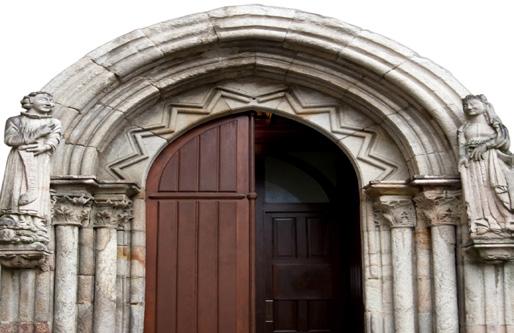
For the latest news 24/7: catholicnewsherald.com
My children love to ask my husband and me to tell stories from our childhood or from the first years of our relationship. Last week, they asked me laughingly, “Did Daddy ever save your life?” While my husband Larry modestly denied any heroics, I launched into a story of his brave rescue of his chosen damsel in our dating days.
I was on day 10 of a grueling mission trip where we were mixing concrete and helping build a village church. Overestimating my remaining strength, I struck out for an ocean swim with my friends, aiming for a nearby reef. Then several of the swimmers, including Larry, struck painful sea urchins, so we began to swim back to shore. I suddenly lost strength and began to panic. He gallantly assisted me back to shore, putting his own pain aside to support my mortified efforts at buoyancy.
Later, I learned Larry had chosen St. George as his confirmation saint many years before. He has multiple artistic renditions of the famed moment when George slays the dragon to free the princess. Our boys have always loved that story.
Recently, there has been a well-intentioned emphasis on the difference between true hagiography (stories of the lives of the saints) and the legends that sprang from their enthusiastic cult followings. St. George saving the princess is likely a medieval fabrication rather than a historical escapade from this 4thcentury martyr. However, I would argue that there is a meaningful place within Christian storytelling for fable as well as fact.
St. George’s lesser-known martyrdom presents us with a concrete testament to faith and bravery. But his dragon-slaying story gives us an example of the type of heroism a man is capable of when he is focused on the needs of others above his own comfort and safety.
That image is true to mankind and to his spiritual heights, whatever the story origin may be. In fact, it is a reflection of Christ as He willingly faces the devil, rejecting his self-preservation for the sake of ransoming us from our debt to sin and its consequences. We need icons of hope, bravery and virtue in a world where the legal expressions of our faith are continually reduced. If we happen to associate St. George with that image, I imagine that he is graciously helping us to receive the graces available to those of us who would hazard our reputation, comfort and life to the Kingdom.
The other day I heard a popular children’s television show reverse the narrative. In this retelling, the princess enlists the help of a dragon to save a knight in distress. Much could be said about modern media and the bombardment of power princesses and misunderstood dragons. But what interested me was that in the new story we lose the unique expression of feminine and masculine strength conveyed in the original story. The medieval princess was a willing victim, facing the dragon because she wanted to save her people from his wrath. The knight was not forced to intervene but chose to do so because of his honor and charity. In his humility, he refused any offers of gifts or of power the king could give in thanks.
Author and Catholic essayist G.K. Chesterton felt that children’s stories serve a deeper purpose than mere entertainment. He wrote, “The (child) has known the dragon intimately ever since he had an imagination. What the fairy tale provides for him is a St. George to kill the dragon. Exactly what the fairy tale does is this: it accustoms him for a series of clear pictures to the idea that these limitless terrors had a limit, that these shapeless enemies have enemies in the knights of God, that there is something in the universe more mystical than darkness, and stronger than strong fear.”
Virtue is a real source of power because it comes from Him who is all good, all powerful and all loving. Modern heroes who are all brawn or genius tech fail to give us an honest portrait of hope because, even after several cups of coffee, we are not superhuman. We need someone to show us how to be brave and faithful even when we feel weak. St. George does that for us, as a true martyr and as a legendary icon of virtuous courage.
In the first edition of “A Good Man Is Hard to Find and Other Stories,”
Flannery O’Connor placed the following quote from St. Cyril of Jerusalem at the front of her book: “The dragon is by the side of the road, watching those who pass. Beware lest he devour you. We go to the father of souls, but it is necessary to pass by the dragon.”
I encountered this dragon recently online. A few weeks ago, one of my Instagram followers informed me that someone had set up a new account impersonating me. This same person shared a screenshot of the fake account (I was unable to find it through my own search, as the imposter had blocked me), and I was shocked to see how authentic this phony account looked. The imposter copied my profile photo, my bio, many of my pictures, and had more than 3,000 followers. One would have to look very carefully to notice that there was an extra character added to the end of my name in this fraudulent account, otherwise, you would think it was me.
I notified Instagram of this imposter account through the app, and I asked my followers to beware of it, block it, and report it. But, as days passed, this phony account continued growing in followers and becoming more aggressive in following people who followed me. I received more direct messages from people informing me of the impersonator – this dragon by the side of the road. So I decided to file a formal report.
That evening, I was tired after hearing three hours of confessions, but I easily found the site for reporting imposter accounts to Instagram. I followed the instructions carefully to prove my identity and to expose this dragon as a fraud. I took a photo of myself holding my driver’s license in my hand and submitted it. It didn’t occur to me immediately, but later that night, I suddenly realized that I’d been duped. That website was an imposter, too!
I just sent a photo of myself holding my government-issued ID to a fake website.
I felt sick. I felt violated. And I experienced deep embarrassment for being tricked so easily. Quickly, I called my credit card company, changed all my online passwords, and the next morning, after a terrible night of sleep, I ordered a security service to monitor my online accounts.

Since then, I’ve thought a lot about people who make a living by deceiving others online. I’ve wondered about who took up that photo of me in my Roman collar, holding my driver’s license, and how it might be used in the future to scam other people – pretending to be a Catholic priest through direct messages, asking for money or gift cards, or maybe something worse to unsuspecting victims. I’ve considered the impressive amount of time, energy, creativity and intelligence that it takes to create fraudulent online accounts and phony websites, and I can never wrap
my mind around it all. And maybe that’s for the best. Evil is a mystery. It’s hard to understand.
The strange thing about scam artists, phony websites and imposter Instagram accounts is that they reveal some important realities about our human condition.

First, they disclose that we human beings are agents of truth. We desire to interact with reality, not just with appearances of reality. If we have a choice between what is authentic and what is counterfeit, we want what is real. The only reason that scams work is because they twist, distort or imitate what is true. If they didn’t, we wouldn’t fall for them.
Interestingly, sin works in the same way. The devil cannot create, but he can distort what has been created. The reason sin is attractive is because something about it looks good and true.
Second, scams show that we human beings tend to be generally trusting of our senses and of other human beings. By our nature, humans approach the world with a stance of belief, not doubt and suspicion. We are surprised and hurt when what we thought was true turns out to be false, and the surprise and hurt increase the more we know the trusted person or resource. Recall Psalm 55: “If this had been done by an enemy I could bear his taunts. If a rival had risen against me, I could hide from him. But it is you, my own companion, my intimate friend!”
Third, online scams reveal that human beings want to believe in the goodness of other human beings. Most of the online accounts impersonating priests today are created to ask faithful people for money or gift cards to help someone in need, and the reason people offer to help is because they desire to do good for the least of their brothers and sisters. The people who fall for these scams do so because they intend to act virtuously. They want to help their pastor or a priest they follow online help others. Scam artists take advantage of this benevolence of unsuspecting people.
Finally, scams remind us that we live in a fallen world. There are certainly more reminders that our world longs for redemption, but, when we get duped, somewhere deep down in our heart of hearts, we know that it shouldn’t be so. When we get scammed, we know the law of love has been violated. But, until we finally reach the father of souls, the danger is real. Beware of that dragon.
FATHER DAMIAN FERENCE is a priest of the Diocese of Cleveland where he serves as Vicar for Evangelization, Secretary for Parish Life and Special Ministries, and as Professor of Philosophy at Borromeo Seminary. He holds a licentiate in philosophy from The Catholic University of America and a doctorate in philosophy from the Pontifical University of St. Thomas Aquinas in Rome. You can follow him on Twitter @frference. This article originally appeared on www.wordonfire.org.
St. George’s dragon-slaying story is a reflection of Christ as He willingly faces the devil.
The trend is clear. As the Hispanic population grows quickly and steadily in the United States, fewer Hispanics self-identify with Roman Catholicism. Nearly 63 million Hispanic people live in our country. On April 13, the Pew Research Center reported that about 43% of all Hispanic adults in the U.S. self-identify as Catholic.
Just a decade ago, in 2010, that estimate was 67%. The drop is rather breathtaking.
Yes, there was a time within very recent memory when most Hispanics were Catholic. That is not the case today. It is unlikely that the trend will reverse in the foreseeable future.
Contrary to popular belief, most Hispanics who stop self-identifying as Catholic do not join Protestant communities or other religious traditions. A good number do, however, and there is a sense that they do so searching for something that they did not find in the religion of their childhood, or at least in the institution that mediates it.
The biggest phenomenon affecting Hispanics in America is this: They are religiously disaffiliating, which has become a de facto highway into secularization. About 30% of Hispanic adults are religiously unaffiliated, and most of them are former Catholics – another breathtaking piece of information.
The last half century has been a roller coaster for the Catholic Church in the U.S. vis-à-vis the Hispanic experience. Hispanics went from being about 10% of the Catholic population to becoming the major source of demographic vitality for our Church.
Today, nearly half of all Catholics in the country are Hispanic.
During the 1980s and 1990s, immigration from Latin America and the Caribbean was
the main engine of growth for the Hispanic Catholic population. Since millions and millions of immigrants from these regions in the continent were Catholic, it was natural that their presence would tilt the demographic scales of U.S. Catholicism.
When most Hispanics were Catholic, pastoral leaders at all levels – from bishops to catechetical leaders and pastors in parishes – viewed this population as a breath of fresh air, injecting new life into faith communities and structures. That’s still the case in our day.
But the positive reception of this breath of fresh air has not always been of one mind. There have been pockets of resistance among some Catholics who see the fast growth of Hispanics as a threat. Others seem to have adopted a “let’s wait and see” attitude.
Resistance to embracing the blessing of a young, dynamic and profoundly Catholic population and integrating it in all our Catholic structures, including parishes, schools and organizations, has led to the lack of appropriate investment in the evangelization and retention of millions of Hispanic Catholics.
When most Hispanics were Catholic, we took them for granted. That is perhaps the best assessment I can offer at this point, after dedicating much of my career as a theologian to studying Hispanic Catholicism.
The fact that only 4 in 10 Hispanic adults self-identify as Catholic changes the rules and calls for fresher conversations. Most Hispanic children in the United States born henceforth will not grow up in Catholic households.
Hispanics are a lifeline to the vitality of U.S. Catholicism, especially as the EuroAmerican Catholic population ages and declines numerically and as the Catholic presence dwindles in parts of the country where Catholic life strongly defined local cultures.
Recently the Fifth National Encuentro of Hispanic/Latino Ministry research team, under the auspices of the U.S. Conference of Catholic Bishops, estimated that in 2021 nearly 31 million Hispanic Catholics lived in our country.
That’s a sign of hope. Let’s not take them for granted.
Pope Francis
From online story: “Martyrs witness to the power of love, pope says”
The Catholic News Herald reached the Facebook feeds of more than 132,000 people in English and Spanish in April. The most talked about post? Charlotte Catholic High School’s spring sports signing day. Join the conversation: www.facebook.com/CatholicNewsHerald.
On YouTube in April, videos produced by the Catholic News Herald were viewed more than 30,000 times. The most-watched video so far this month? The “Las Siete Palabras” (“Seven Last Words”) series featuring two recently exiled Nicaraguan priests who now live in Charlotte.
From April 1 through press time on April 26, 26,538 visitors to www.catholicnewsherald. com have viewed a total of 37,811 pages. The top five headlines in April so far have been:
n Bishop Jugis announces new pastoral priorities for the diocese ........................................... 1,043

n St. Patrick Cathedral reopens for Holy Week, unveils striking renovations 979
n 7 Charlotte Catholic student-athletes sign for college sports 774
n Las Siete Palabras ................................................................................................................................... 766
n Bishop Jugis: This Easter, resolve ‘to make a new beginning in Christ’ 465

The Catholic News Herald welcomes letters from readers. We ask that letters be originals of 250 words or fewer, pertain to recent newspaper content or Catholic issues, and be written from a perspective of Christian charity.
To be considered for publication, each letter must include the name, address and daytime phone number of the writer for purpose of verification. Letters may be condensed due to space limitations and edited for clarity, style and factual accuracy.
The Catholic News Herald does not publish poetry, form letters or petitions. Items submitted to The Catholic News Herald become the property of the newspaper and are subject to reuse, in whole or in part, in print, electronic formats and archives.
E-mail: catholicnews@charlottediocese.org
Mail: Letters to the Editor
Catholic News Herald
1123 S. Church St. Charlotte, N.C. 28203
‘Today there is persecution of Christians in the world. A lot. There are more martyrs today than there were in the first centuries of Christianity.’
‘Hispanics are a lifeline to the vitality of U.S. Catholicism.’
